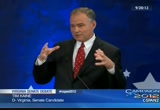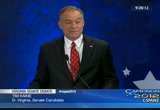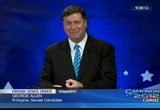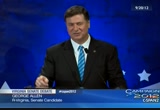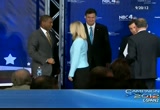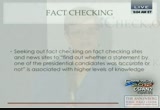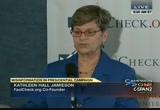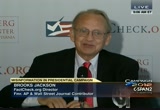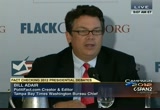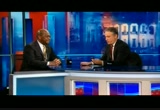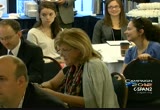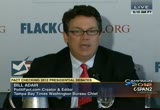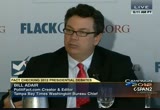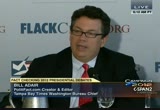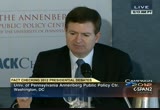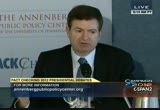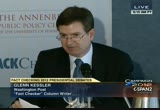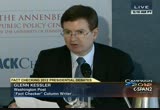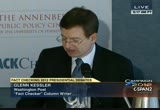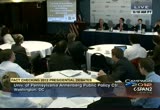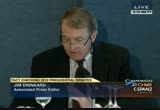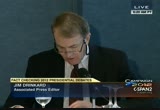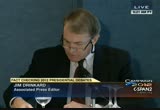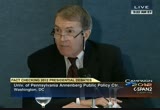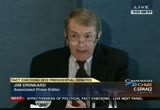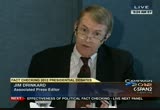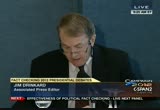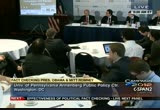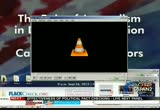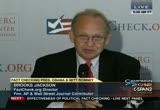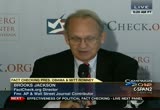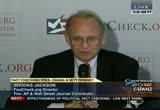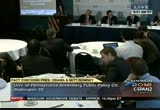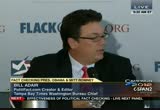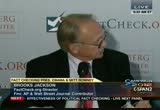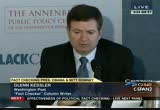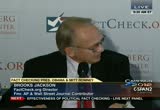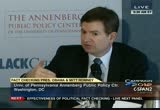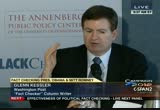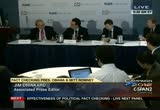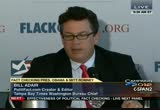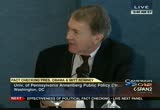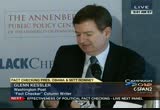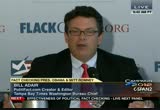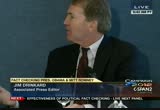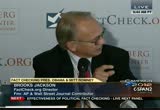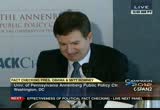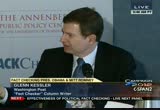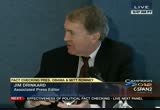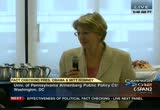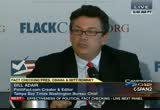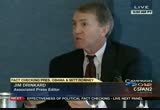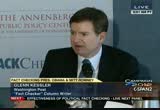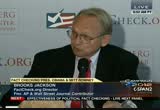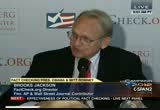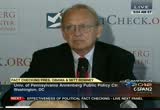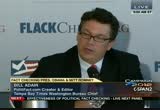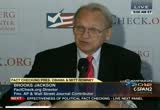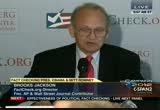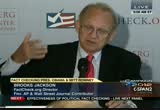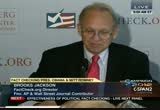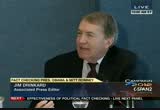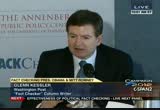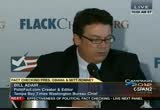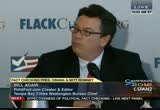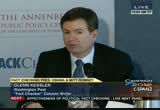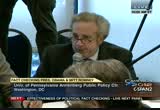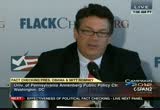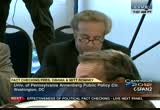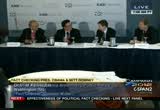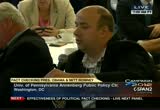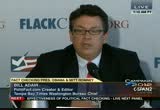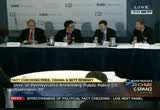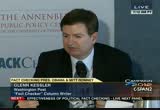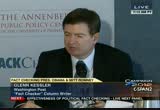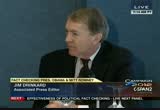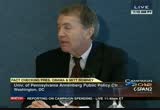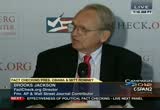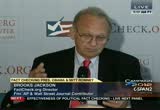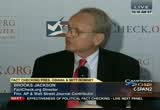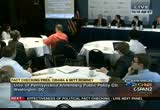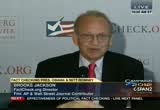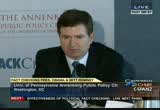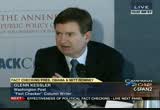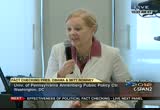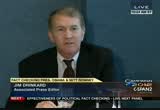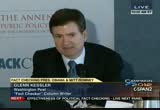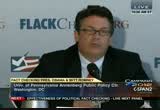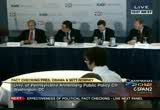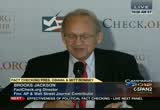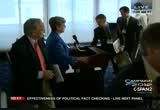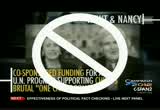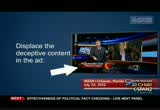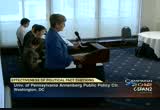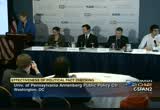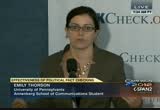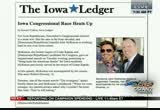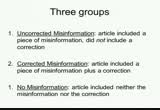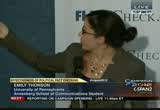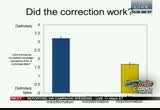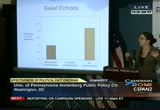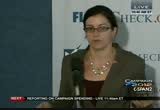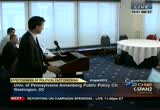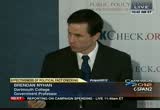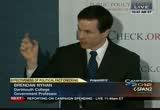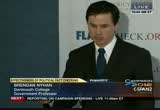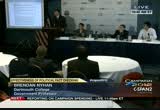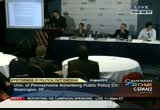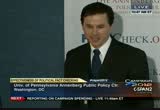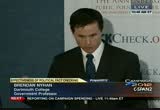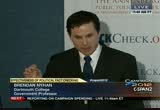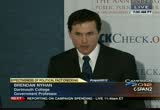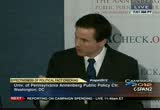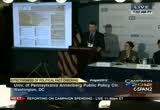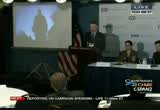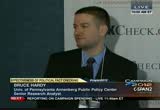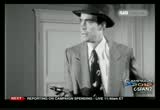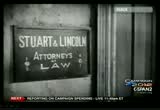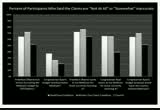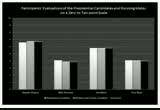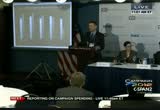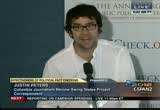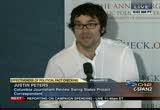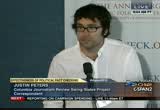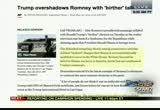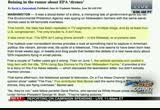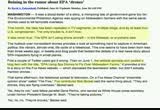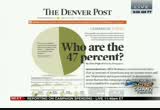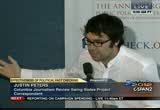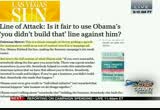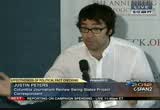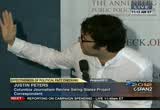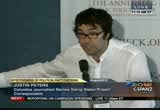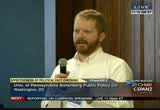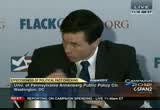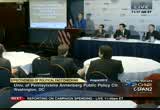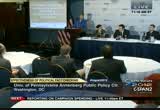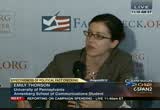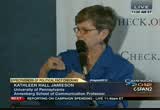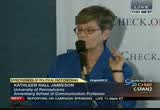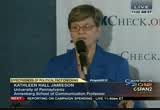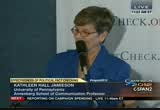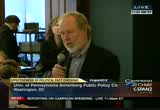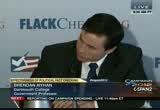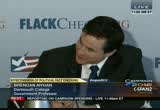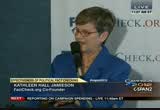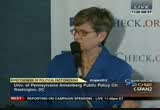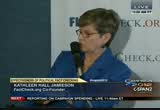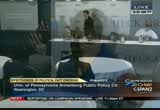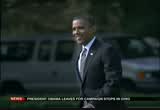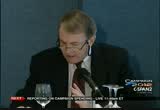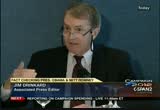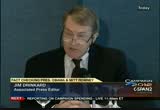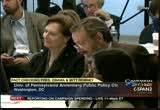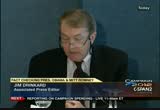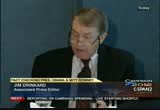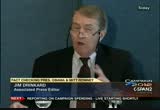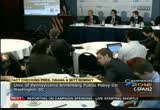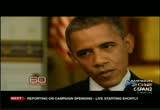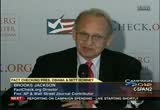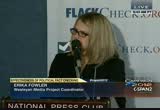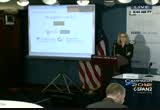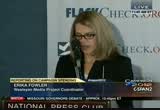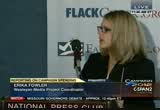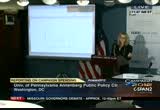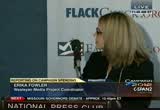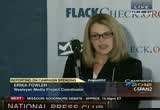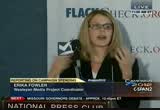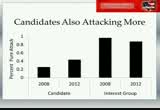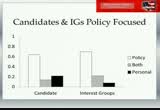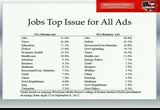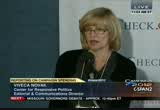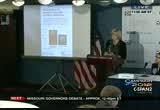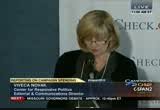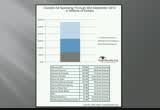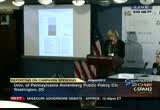tv U.S. Senate CSPAN September 26, 2012 9:00am-12:00pm EDT
9:00 am
too many people were playing chicken with each other on capitol hill rather than look at the 300 plus million american people who are depending upon them and trying to do the right thing. we've got to fix washington so that it is a place that is about results. we've got to grow the economy. we talked about some strategies today. i've got a plan that encourage you to check out on the website. it's basically about infrastructure investment. the kind of small business to level the playing field we did. we've got to find common ground and fix the budget. congress is stopping progress right there. there's too much division in congress and that's why s&p and moody's is basically saying we've got to put some people in there who are willing to compromise. the challenge that is on the table before us right now is this issue of sequester. i've laid out a pretty simple straightforward plan, but the bush tax cuts expire as planned over 500,000, fix medicare, take away unnecessary subsidies. then you get a $100 billion annual cut down to a $23 billion
9:01 am
in savings that i know we can find. it's time for specifics. it's time for action but it's time for working together. allen: thank you for this opportunity have this debate here today. tim, you can't talking about that plan. we still that mohammed jobs will be affected. you want to raise taxes on exxon mobil and others. i'd like to know what the impact on jobs. folks, there's a clear choice in this an election. and which approach will be best for jobs here in our country. i envision a better future than what we are entering today. steve asked me earlier about who are you targeting in your campaigns. you're asking me various personages. i think about 99% of the folks should be on our site. anybody uses electricity, anybody who drives a car, anybody who pays taxes, anyone who works for a living or wants a job or anyone who cares about their families future ought to be on our site. i figure that's about 99% of the
9:02 am
people. why? because the electricity prices for the cap-and-trade energy tax that tim has supported would cost skyrocketing electricity and affect our technology community. people are paying $30 more every time you fill up compared to january of 2000. so if you like high gas prices, but if you want more affordable. and i want to allow us in virginia to produce oil and natural gas off our coast and use those royalties for roads and transportation. that would be the first bill i would introduce as your center. if people want a job, our approach is create more job opportunities for people. and whether it is young people are middle-aged folks, 20% of the folks in the country or underemployed or unemployed. we need to turn it around so i respectfully ask for your support, talk to your associates, friends, neighbors. let them know. if they use electricity, drive a car, want a job, or care about the future of the families they ought to join the alan t. go to our website, and most
9:03 am
important i look forward to making sure that america is ascending once again and is a land of opportunity for all to capture their dreams. tim governor allen, thank you very much. thanks to both of you. that is going to conclude our debate today. i want to thank the fairfax chamber for hosting this debate and, of course, the governor allen, governor kaine for their participation. thank you as well to our terrific panel. julie and aaron. don't forget stay with nbc news r continuing coverage of decision 2012 and don't forget to vote on november 6. thank you. [applause] >> [inaudible conversations]
9:04 am
>> [inaudible conversations] >> from the highest credit a -- >> we are live this morning for a congress on the role of the press in the 2012 election. the annenberg public policy center at the university of pennsylvania is hosting to stay long discussion. they are starting to look at misinformation and with fact checking works. later today go be a panel on deceptions in the upcoming presidential debate. this is just getting underway live from the national press club here in washington. speaking out is kathleen hall jamieson, with the annenberg public policy center. >> this is the question wording, to find out whether a statement by one of the presidential candidates is accurate or not
9:05 am
his associate with higher levels of knowledge. the controversy this year about whether fact-checking matters, this association would suggest that it does. there's always a question is more knowledgeable people simply come to the site and as a result we see a correlation but we have because the inference wrong. in order to tighten down that inference we control for those factors that might increase knowledge such as closely following the campaign, education, ideology, gender and the like. it doesn't establish a causal inference but increases the likelihood we have the direction of causality correct. to get a tight causal inference we do need to go to a controlled experiment. we will report one of those in the second panel and its conclusion will be the same. fact checking by in the fact checking sites, sites that develop their fact checking at length, and also the fact check model which is visually claims that we been doing at the annenberg public policy center according to the study which is
9:06 am
in panel to produce the same finding. and as result we think that that traditional argument for the causal direction being fact-checking sides in news every on the web as well as standalone sites can increase public knowledge. with that as the background, it's my pleasure to introduce brooks jackson, a factcheck.org who will introduce the first panel. the first panel will forecast what it sees as a possible and we hope not actual deceptions of the presidential debate. brooks jackson. >> thank you. i know that the sign we were given is laid out in the title of this panel, fact checkers forecast discussion. this is not forecast whether nothing will be deceptions. when we put this up to our colleagues and we kicked it around and formally nobody pushed back against the premise, but if any of you think there will be no deceptions during the
9:07 am
debate, please feel free to say so. i'm going to introduce my colleagues and panelists here in turn, and each of them is going to give their prediction about next week's debate. we'll start off with elegant, director of, founder of the pulitzer prize-winning site called politifact.com. a journalist of many years experience here in washington. bill, what are we going to see? >> i'm going to be a little bit -- we had a discussion last week of what we expected, and i offered to be a little country because glenn made the point that he did not think that mitt romney would use the line that we've all been discussing so much, and that kathleen mentioned in the survey, the claim that obama has gutted welfare reform and has, i'm sure you've seen that ad, that all three of us, all four of us i think have debunked. so i want to play a little short
9:08 am
video as an example of, about this and talk a little bit about why i do think we will hear. here we go. >> so this is a video from -- >> i will be the first to publicly say i was wrong, ms. coppola. because my objective is for people to know the facts and the truth on all of the stuff. >> you know what you should do? let me tell you what you should do. you should go on some kind of a truth tour. [laughter] spend as a matter fact i already have one plan. >> what do? that sounds crazy? what's it called? >> it's called the truth tour las.[laughter] >> is called a truth tour. was a going to to go? >> thirty states and three events a day.
9:09 am
>> all right, this is from politifact. [cheers and applause] >> politifact checked a romney campaign and claim that obama ended welfare work requirements earlier this month. rating it pants on fire. [laughter] that i believe is one of, i don't know what that means. but clearly that would be uncomfortable. in reality, the obama administration has said it will consider proposals from states that are aimed at finding better ways of getting welfare recent beans into jobs. factcheck.org and the "washington post" fact checker have said the same, that the claim is false. [cheers and applause] >> what do you say? >> ladies and gentlemen, -- >> allow me to respond.
9:10 am
>> the truth tour begins tonight. >> i should've set that up at the beginning of that was herman cain maintaining the same point that romney campaign has, that the obama administration is getting rid of the work requirement. and what i thought that showed was the importance of fact checkers in this campaign. and i really think, and brendan and glenn and i were just talking about how things are different this time compared to 2008. there's more fact checking than ever, and the fact-checking hasn't taken much greater prominence this time. the candidates are being asked about it. i got a call from cnn last night that they had asked mitt romney in an interview about how the fact checkers have debunked that ad. and about other ads. and so i think this year more than ever there is fact-checki fact-checking. and this year more than ever fact-checking is playing a role
9:11 am
in the campaign. and i think the survey indicates that people are better educated when they come to our sites, and i think in addition the rest of the media is talking about our work in great ways. everything when we look back on this election, we will say, this was the year of the fact checker. this was the year that fact-checking really hit critical mass. lets me get your predictions. i think this will come up in the debate. i think you'll come up not because mitt romney will bring it up but because i think you'll be asked about a buy one of the moderators. and i think the romney campaign has shown no signs of pulling back on this. i got a mailing that i live in virginia. i got a mailing in my house from my daughter just registered to vote about a week ago. and it just repeated all the lines in the welfare and. so i think the romney campaign has found a message that it wants to keep hitting, and i think we're going to use that
9:12 am
message. so i think that will come up in the debate. as far as the prediction for what we'll hear from obama, i think an issue, we've seen in the polls, that has really resonated for the democrats has been their traditional scare seniors about medicare tactics. i think that has been working really well. i think obama will bring that up and i think one thing we'll hear is the phrase that romney would end up medicare's guarantee, which is a phrase the democrats have liked to use recently. we've rated that have to on for two reasons. one, it's not like it has a guarantee now. congress can change the medicare benefits any time it wants it. it really has. now, romney would change the structure of which people would pay for medicare and go from being, it would go, it would
9:13 am
turn essentially into a voucher plan. so in that sense we found some truth in it and rated it transcends i think we'll hear that would also. >> thank you, bill. our next prediction from glenn kessler, chapter of facts, order of pinocchio's, geppetto of american journalism, journalist of decades of experience here in washington. glenn, your prediction, what are we going to see? >> i have too. they both deal with medicare. one thing i always say is the more complicated a subject is, the more susceptible it is stretching the truth. because when it's complicated you can make assertions that a lot of times journalists don't have the time to check. i do want to say one thing about welfare. the reasons i said that i didn't think romney would bring it up, is because he didn't mention it in his campaign speech. i become in his acceptance
9:14 am
speech. and the issue is a very complex one with many sides to that story. and though i did rate the romney ad with for pinocchio's because it really went over the top of an extreme interpretation, the obama administration's counter spin leaves a lot to be desired. that is something very fishy going on with the issuance of the memo over the summer, the people that were behind that memo, in the administration have long been skeptics of the welfare law. so i've not gotten quite to the bottom of it but i have given the obama campaign three penalties and to pinocchio's for the counter spin. also in particular the way that president clinton spoke about at the convention. so it's a complex subject and one of the reasons i didn't think romney would necessary bring it up himself into debates is because it would allow for a very muddy back and forth between the two men.
9:15 am
i think and debate your most effective if you can make a clean shot. and resonate with voters. to my predictions, romney will repeat his claim that obama got $700 billion from medicare. now, during the primaries the republicans used to claim that obama fund his health care plan with $500 billion in cuts. so how did it balloon to $700 billion? is a simple explanation to the congressional budget office over the summer issued a new asset based on a different and later tenure timeline. and so republicans decided to take the biggest number possible. but medicare spending does not mean it is being reduced to in the $700 billion figure comes from the different over 10 years between anticipated medicare spending, what is known as the baseline, and changes to laws made to reduce spending. the savings are mostly run out of from health care providers, not medicare beneficiaries. and actually the medicare
9:16 am
actuary raised significant doubts whether any of these cuts would take place because there actually a bit onerous. according to medicare trustee reports, for those -- proposed reduction in spending action strengthens the long-term health of the medicare program. and affect house republicans adopted many of the same cuts in their own budget, a point bill clinton made rather effectively in a speech at the democratic national convention. they argued those savings to reforming medicare am not defining a new entitled. that's a very important difference. both parties agreed controls on the medicare spending but they disagree over the best path forward. this is a claim by the republicans i have given two pinocchios. meanwhile, obama claims that paul ryan's plan for medicare would force seniors to pay $6400 more a year to make up for cuts in the program. this is an old democratic attack line. it's been around for a look at
9:17 am
the bottom is it's based on an earlier version of ryan's plan. another thing i've given two pinocchios. people should always be wary of dire predictions far off any future. the city $400 figure refers to an analysis of the cbo as that of a different less generous ryan plan. goes all the way to year 2022, the cbo made no estimates of the new version except to say that beneficiaries might face higher costs. the new ryan plan was changed in other ways that would change the option of traditional medicare. he decide to set the future growth rate to medicare to the same metric used by obama and his method so there wouldn't be a difference. and the study published recently by the journal of american medical association suggests the out of pocket payment for additional medicare would be only $800 more a year under the ryan plan. that's odyssey significantly lower than the $6400.
9:18 am
strangely president obama was at the aarp last week and the use the $6400 figure which appears in many of these ads, but then he added something interesting. he said now, now, that was in his original plan at a want to be fair here. he then modified it because there was a lot of pushback from seniors. so we said we will have a traditional medicare stand side-by-side with the voucher program and no current beneficiaries will be affected. heat was so striking that he would undercut the message of his own ad that "the new york times" headlined its article in his remarks, aarp convention, obama place fact checker in chief. so i that is kind of an interesting moment when the president in effect acknowledge that these ads were using simplistic, out of date figures. and if he uses this line in the debate, i wonder if romney will pounce upon it. >> and my third colleague and panelist, jim drinkard i is that
9:19 am
"the associated press" were i started many years ago. jim, i'm looking at the combined experience of your of covering washington and all the baloney that gets issued here, and we have i think among us more than a century of dealing with these kind of things. jim, your prediction for what are we going to hear in the debate? >> well, there's a little pattern here. you can see that, and it follows the social science victims that the best predictor of future behavior is past behavior. so, you know, a as a wire servie that i'm normally into prognostication business but i feel very safe going out on a limb today. eight months ago in the state of the union speech, obama issued an appeal to congress to spend more federal money on construction projects that would generate jobs. what he said was, take the money
9:20 am
we are no longer spending it for, use half of the to pay down our debt and use the rest to do some nationbuilding right here at home. well, we pointed out in a fact check that night the fallacy of that idea. the idea that some kind of budget surpluses going to be created when you stop the war is fiscal fiction. those wars have been primarily financed by borrowing. so if you stop the wars, you don't have pneumonia. you just have less borrowing, must debt being added. it doesn't create a pool of ready cash, and on top of that the supposed savings of this supposed peace dividend is inflated because it's based on spending numbers that are extrapolated into the future that come from sort of the height of the intensity of the war, and they don't really follow the downward trend that
9:21 am
is spent in reality. so we pointed all of that out in a fact check, the night of the state of union i. so how did the administration react? well, three weeks later the president issued a budget that claimed $850 billion in savings from the wind down of the wars, and steered about 230 billion of that to highway construction. the president of the committee for responsible federal budget said the administration's logic was like a kid graduating from college who had financed most of his tuition with student loans and saying wow, all that money, now i can spend on something else. the reality is there is no money, and you're stuck with a bunch of debt. so we fact checked the budget as well that night. so fast forward to the acceptance speech in charlotte three weeks ago. obama barely changed a word.
9:22 am
he said i'll use the money were no longer spending on poor to pay down our debt and put more people back to work, rebuilding roads and bridges, schools and right with. after two wars that cost us thousands of lives and over a trillion dollars it's time to do so nation but right here at home. said the bomb used pretty much the same words, so did we and our fact check that night. we just recycled what we have said before. so when brooks asked us, the three of us a couple your to predict mistakes candidates would make again, in the debates, this one seems like pretty much like a natural. and even before today, actually last friday in woodbridge virginia at a rally, obama said again he wants to use were savings to pay down the debt and put people to work. so i would say that's a pretty good bet for the debates. for romney i've got a prediction that i think is just a solid, and it kind of goes back to the top of his campaign book two
9:23 am
years ago, no apology. ever since romney has made it a point to produce content criticize obama every time he thinks there's any with of apology in something the president has said. i first heard myself first person last april here in town when romney was making a speech to group of newspaper executives, and he blamed obama for being -- for the anemic recovery and said obama's in tension have been elsewhere. he wasn't focused enough on the economy. his attention had been on things called like a government takeover on health care and apologizing for america abroad. in our fact check that day we quoted what obama had said, and in overseas trips, including an assertion that times the u.s. had acted contrary to its own ideals already been selective in where it sought to promote democracy.
9:24 am
it has sometimes shown arrogance towards allies. we also pointed out that when he made those kinds of statements, that suggested the u.s. is completely above reproach, that he usually balanced it with praise for things the country had done right. and all that, fact check on that point, it is a long tradition of presidents acknowledging past imperfections. but these do not bite any normal dictionary about two apologies. and either formal or informal. so then again last month when romney accepted his party's nomination, in tampa, he repeated the assertion that obama had begun his presidency with an apology to her, and that obama had confessed that u.s. had dictated to other nations. that days fact checked story went into greater detail pointing out obama's trips to
9:25 am
europe, latin america, to the muslim world during his first months in office, noting the occasions where he'd said the nation had made mistakes, and noting the context, and most of those cases the context was a call for better relations with other countries, after what he described as damage done by misguided moves by his predecessor, bush. so we fact check that, and again, it didn't seem to make a difference to the campaign. earlier this month when the violence broke out at u.s. diplomatic outposts in egypt, romney jumped to accuse obama of disgraceful handling of the situation, including sympathizing with those who waged the attacks instead of condemning them, and making it a
9:26 am
quote apology for american principles. again, we fact checked that and we pointed out that neither an unofficial statement from the cairo embassy nor statement from secretary of state hillary clinton who wrote obama's own statement had any sympathy for your doctor. and administrations condemnation of religious incitement from the anti-muslim film didn't come anywhere close to being an apology. again, by any definition. so i have a feeling that romney stands ready to apply this overly broad definition of apology at any opportunity in the debates are during the in game of the campaign. >> thank you, jim. before i make my own prediction, i want to know something kind of remarkable has happened the last couple of days. both candidates have been asked about or referred to fact checking, and the reaction to it. we've got a clip i think of what
9:27 am
president obama said in a "60 minutes" interview. this was not put on air but was put out by cbs on its website but it's kind of interesting. >> the stakes are high. >> the fact checkers have had problems with the other both sides and say that they have been misleading and in some cases just not true. does that disturb you? some of them are your ads. >> you know, do we see sometimes us going overboard in a campaign, mistakes that are made or areas where there's no doubt that somebody could dispute how we are presenting things? that happens in politics. >> are the american people and title ii the truth or a better version? >> the truth of the matter is most of them were having a vigorous debate about a vision for the country, and there's a lot at stake in this election. so is it going to be sharp sometimes? absolutely, but will the american people ultimately have a good sense of where i want to
9:28 am
take the country and where governor romney -- >> so, there you have the president saying well, should we go overboard and make mistakes, i.e. saying things that are not true? that happens. yesterday at a don't have a clip of this cnn was pressing that romney on the welfare matter, and he made a statement that well, whenever we have made mistakes or false claims, we have corrected them. but we are not aware, are any of you aware of any corrected adds that the romney -- well, the romney campaign was neither when cnn pressed him for samples. although they have a crack at anything, romney seems to have stated that they have made some incorrect claims. i think that the likelihood is that we will hear some twisted or false claims coming up. because this is not unique to
9:29 am
this particular campaign. this has been going on for a long time. we have pretty strong evidence that greeks holding forth in the encore in athens 2000 either just go work polling the wool over the eyes of voters even back then. i've noted that at least with obama, we've already heard, when he is speaking in person can be somewhat more circumspect and careful about nuance and some of the stuff you see coming out of his ads. in one case that you've heard about actually, corrected or contradicted his own advertising. so to make my predictions i have sort of throwing darts at the claims that they make in their stump speeches, romney and obama. we recently did take outs on the standard speeches they give. many examples of fact twisting
9:30 am
and i'll just pick a couple there. one from each side. i predict it's quite likely that we will hear mitt romney say that gasoline prices have doubled under obama, which is an example of one of those things that yes, literally true if you look at where gasoline prices were when he took office. they have plummeted due to the worldwide near depression that we suffered, but the fact is they have never quite gotten the site under obama as they were for several weeks in the summer of 2008 under bush. i think we will also hear president obama say that we have created half a million manufacturing jobs, and he will drop his voice and say in the last 29 months, which, of course, isn't his entire
9:31 am
administration. he measures it from the point where things hit bottom. yes, it's true we have regained fewer than half of the more than, a million manufacturing jobs that have been lost on his watch. that's another way of putting it. not false claims but claims that lead a false impression, if you don't look at include. and i think we'll hear a lot more of that. i'm going to ask a few hopefully provocative questions of our panel here to get the discussion going before we throw it open to questions from the audience. arthur claims for any of you, as you think it made in the past where you have found to be false or badly misleading, that they're not going to repeat for some reason? jim. >> i feel fairly certain that we will not hear romney conflate the people, the number of people who are bound to vote for obama, the number of people who don't
9:32 am
pay federal income tax and the number of people who receive some sort of federal benefit, that that's all the same 47%. i doubt we will hear that again. >> anybody want to disagree with that? probably not. >> [inaudible] >> depends on, it was consumption by very small public. those with big wallets i guess. >> i think that gets to an important aspect of our fact checking. we focus on the big national messages, but we know that there are, there's lots of microtargeting going on that is using very precise media to get very precise audiences. we are not seeing that. and we try, we asked our readers to submit ideas through facebook and e-mail and whatever, and we
9:33 am
get a tiny portion of the. but i think case in point, this meant i got from the romney campaign, you know, maybe that's not going to be a message we hear romney asserts that the debate. but it's clinton won the campaign is continuing to make a i've talked to campaign people and they will tell you hey, you don't know about the ads. you didn't see that are running and the timing -- tiny markets in ohio and florida and whatever. so i think there are plenty of those. >> i guess what i'm wondering about, we heard one example of the president being more careful about the facts when he was speaking in person. than his campaign is when putting things out. i think probably we will not hear barack obama claimed that mitch romney favors a ban on abortion even in cases of incest or rape. totally false. cynical misrepresentation of romney's actual stance which is been quite clear and consistent
9:34 am
ever since he switched to being generally against abortion. by don't think you will -- [laughter] >> i'm just -- he hasn't always had this position, but since he has adopted his present position it's been clear and he has favored the usual exceptions. and the obama campaign has at least two tv ads repeating this, utterly false claim, misrepresent but i don't think we will hear that out of the mouth of the president. >> do you share my view that the candidates are more circumspect in person than they are, then the campaigns are in the advertising? or is it just the president and not mitt romney, what do you think? >> well, particularly in a high-stakes situations like a debate, if your talking about the debates, i think that they will be more circumspect. i mean, i can't offhand think of a claim that we've added that
9:35 am
they would our would not necessarily -- would or would not message of say. i mean, you say during the republican debates that there were moments when one would turn to the other and say, you got four pinocchios for that or that was pants on fire. so you don't want to get into a situation where you are exposed in the by, particularly because with the internet people can quickly look these things up and see. i mean, i noted that coming in a, when one of instead you got four pinocchios about the clink of the next day i tens of thousands of hits because people have gone to the web and looked up what newt gingrich was talking about. spent another question. recently one of mitt romney's operatives made a statement to reporters when they're pushing him on the claim about, well,
9:36 am
it's our most effective at and we're not going to have our campaign dictated by fact checkers. i think a lot of probably naïve news editors were rather shocked at the cynicism that they heard coming out of this polltakers mouth. so my question, you've been around the longest, were you shocked? did this surprise you? >> i really can't say that it was because, you know, they had kind of behavior that way all along. they are certainly not terribly worried. they're not worried enough to change the rhetoric when something is pointed out to them. and in speed do you mean the romney campaign's we? campaign's? >> now. >> [inaudible] >> this is -- my take on this, i'm in the context of that question and answer was actually they were saying that this is
9:37 am
the most effective ad, and john of abc said that got four pinocchios, so the response as well, we are not going to let our campaign be dictated by fact checkers. and what he means by that, i mean, politicians in both parties stretch the truth if they feel it will give them a political advantage. and if that's their most effective ad, it doesn't matter what a bunch of, you know, nick take a journalist might say about it because that add news people and has an impact. i have seen both obama and romney suddenly tweaked or change language, or drop language that were called out by fact checkers because ultimately there was a decision that are that it doesn't really mean that much to us if we fix this. it will get less greece if we just tweak it a bit or change it on the margins. but the key thing that moves voters such as he apologizes for
9:38 am
america, or obama with a ridiculous thing about the savings from the wars, which he says, and the same breath criticizes george w. bush for running wars on the credit card, he will say those like almost 1 cents after another without any since he is contradicting himself. there is polling there that says that's an effective line. it moves voters eric so it doesn't matter what the actual facts are. so that's, that's when -- >> i think fact checkers come to this with their own sets of thoughts and ideas and backgrounds. and any since he is trying to redefine what a fact is. pretty saying there are no objective facts, that it's just someone else's opinion about what we are saying. so, you know, it's kind of like redefining apology. they are redefining what are facts.
9:39 am
>> also, let me add spent i don't want to be unfair to romney. my own view is that the attitude on the part of the obama campaign and the romney campaign is pretty much equivalent. the surprising things that somebody from either campaign said it out loud, and so shocked news editors who had been paying all that much attention previously. i mean, are there differences? to any of you see differences in attitudes of the campaign apparatus? >> i think what jim said about the no apology theme is the same thing applies to obama. campaigns are about themes and messages, and the campaigns have decided these are the five or six or however many things we're going to be. and they are going to hit him repeatedly with as much evidence as they can muster. and at some point they've got to stretch the truth to make those points. and both of them are doing it. we talk about abortion but it'll be interesting. here's how i can see the abortion once laying out. is that, obama i'm sure
9:40 am
recognizes romney's current position on abortion, that i could see an exchange where he turns around and says, now, you did support the personhood amendment, and couldn't have the impact of outlawing all abortions? and you sort of put romney on the defense of that time and score the point that they want to score and still remain within the facts on that. and, of course, that's how they've tried to connect the dots on abortion is by taking romney's position there. so i think it's all about themes. you know, they have their themes and images keep hitting them. and in some cases they've got to connect dots that really are not there. >> d.c. places for either campaign that is paid a price or misrepresenting facts? >> well, again, as was pointed out it wasn't republican consumption but in the conflation of those groups, the
9:41 am
47%. i think -- >> let's limit this to messages that are intended for general consumption. tv advertising, speeches, that sort of thing. >> that's kind of depressing. last night. >> you follow the reaction that you get from --.net. >> in the photo in the polls or in campaign money or in something that matters. >> it sounds like you have a control group or anything. i mean, what i often say is i don't write for politicians. i write for voters and try to make voters are informed. politicians will react to voters. voters decide they're going to exact a price because they think a politician has been on his, and a politician's will change.
9:42 am
but, because we write a bunch, say something that is not correct, then they wouldn't have paid a price for that, i don't know. i did one thing on romney, for the longest time in his stump speech, he would say the united states was the only country on earth where we put our hands over our hearts when we say the national anthem. which was quickly disproved just by looking at youtube, people around the world going like this when they sang the national anthem. he dropped that the very next day. i don't think he ever said it again. >> he paid the price. >> maybe. >> i would say that's an example of actually changing behavior, which i think happens rarely in small increments. >> and i think the other thing, we're talking before the panel with brendan about this, i think the other thing we don't know was how many conversations are going on with campaign message people, with people making as, with speechwriters come as they
9:43 am
are talking about wording? and how often are they sang well, if we say that the fact checkers will get us. now, i suspect that's happening a lot. but the only evidence i have had of it as a column written by connie schultz who is married to jerry brown, who said that conversation happened in the brown campaign. i suspect it is happening in many campaigns, and i think that there is so much fact checking going on, not just with our for organizations, but with many others around the country. we have partners in 11 states. there are many newspapers and websites around the country that are doing their own fact checking. there's a lot of eyes out there, and so i think that's having an impact. >> if things are that closely vetted and mold over before their set, especially speeches like except the speeches at the convention, when they come out and repeat things that they know are going to be fact checked
9:44 am
again, that suggests there is no price, that they conclude, or that the price is so small that they are willing to suffer whatever it is. >> i think it's too what i was saying, there may be a price but it's balanced against the fact that that is poll tested effective line, that moves voters. so you do a cost benefit analysis like everything in life, the benefits of their completely outweigh the costs of yet another column in the "washington post" that says there's no money there that you're saving from ending the war. >> it happens. >> sometimes i'm struck by the aggressiveness of the ads as i said before, but what comes out of the candidates mouse. do you see a difference in the attitude of the campaign operatives. the people down in the trenches grinding out these ads which they will then face a little
9:45 am
video of the candidate saying i approve this ad, and you may not have even seen it. >> well, i mean, i do no -- >> are the candidates really in charge? >> the super pacs are a whole different world. i mean, so i do, i did have a conversation with one guy who runs a super pac, and this was after he was screaming at me about something i had written, and he just laughed and said i actually don't give a hoot what you're saying because these ads -- >> i bet that wasn't an exact quote. >> i was thinking for tv. sorry. he said, but he said these ads work. they move voters, so, you know, so what? i don't care what you write. you can give me as many and now gives as you want. these things work. he was very up front.
9:46 am
>> some observers have suggested that campaign staffs now see it almost as a badge of honor to be called out by one of us or all of us, showing that they are tough and that they are getting the job done and -- has it gotten that bad? do you think there's that much cynicism in the campaign operation? >> i don't know judging from the complaints we had when you write these things, i would say they still care about that. to some extent. they may not think, they may think the price is affordable. but we certainly get pushback when they have been treated unfairly. >> someone at one point talked about postmodern truth, or whatever. we have to be honest that we can look at a set of facts and come to a different conclusion. and there are times when we look at the same set of facts and not
9:47 am
necessarily come to the same conclusion. so some of that pushback that you get from the campaigns is, they are saying i'm sorry, you may think that's factually inaccurate but we think that factually accurate. who are you to sit in judgment? >> the welfare ad is a good example. because there is a strong current on the republican side that says this looks, there's no trust. this looks like an attempt to undefined the work requirement -- to undermine the work requirement in the current law. but we are sort of being asked to fact check the future because it hasn't happened yet. we don't know -- you can't read people's intentions. you have to listen to what they say, what they put on paper, what they've outlined, and you know them make some judgments about it. but we won't know until and
9:48 am
unless the waivers are implement it exactly how they're going to be used. >> exactly. we now have some time for questions for you in the audience if you'd like to know how it go about our business. please identify yourself and give us your question. weight into the microphone comes spent on meredith mcgehee. i've been working with the league of women voters on a project to help support tv stations when they do this. one of the things we are beginning to hear back from some of the television stations around the country is they don't have the resources to fact check. and they've turned around and say can you help us? we've obviously noted that you have, but i think many of these television stations and to some degree newspapers are saying they don't have the resources to do the fact checking that they would like to do, or that we
9:49 am
would like them to do. particularly in this new economy. so how do respond to those tv stations or to those newspapers who say that, we would like to do this but we just don't have the resources? >> let me address it first just to say we have partnered with, primarily with newspapers but also with public radio in 11 states. and i think we have found a very successful way to scale fact checking. so we now have 11 states politifact sites, politifact ohio, politifact wisconsin, et cetera, where we have trained journalists at newspapers and at new hampshire public radio how did you politifact fact-checking if they do it. doesn't have to be a big organization. they don't have to put up multiple people. we have our smallest partner is nashua telegraph, a newspaper with circulation of about 17,000
9:50 am
faq great fact-checking on the leaders of new hampshire. so we collectively now, politifact has 36 full-time fact checkers around the country. we have talked to many tv stations. none have been willing to make a commitment to it yet, but i can see that happening. so tell them to call me. >> meredith, also as a partial answer, when campaigns put out new ads, ap tries to look at them and do what we call an ad watch. it's sort of like fact-checking version but it's just for television ads. and we try to do those within the first day or two after a new ad comes out, and we can do all them, but if the ad happens to be an added they're dealing with happens to be one of those, there may be some resources on the wire with them. and again, but if them
9:51 am
microtargeting adds that we're not even so, we only treat once we see that look like they're going to get wide distribution around the country. and generally they are the ones are going into the limited number of battleground states. but those are available. >> the only thing i would add, i'm not an empire builder like a bill is here, but i do think that obviously those stations do have reporters that cover politics. and there's nothing that says that you need to have a dedicated fact checker operation. i mean, if you're covering politics, you should be able to say, set aside some time to say okay, let me vet for the candidate has been saying. it just takes a will. but when i was covering the 1996 presidential election for newsday, i came up with the idea of a fact check of what dole and clinton were saying, and i just
9:52 am
took time out of covering the day-to-day campaign to lay out and say, it was ouch on the eve of the debate, said this is what this guy has been saying, this is what you're going to hear, and this is what's true and what's not true. so they have the resources. they just have to figure out how to take those people and deploy them effectively. >> i have two quick observations. it doesn't take a huge staff. for one thing. you have the resources of all the fact checkers up here before you, and others in the media who are doing this sort of thing. so anybody who wants to do this sort of thing at the local level can draw on an awful lot of speed workouts are to be done just by reading what's up on our site. when i started, when kathleen brought me over to the annenberg center from cnn, i was doing this by myself with the assistance of one researcher,
9:53 am
and later to come into 2004 election. we expanded. we now have five full-time journalist beside myself, for this election. but you don't need that many people. it can be done by one. i think he needs to be an experience, smart, good reporter who as been around the track a few times and has been lied to in the so they can recognize this sort of thing and deal with it. you don't want to give this to the latest new hire just out of journalism school, but my second observation is, as the station manager -- asked the station and how much money they're getting from the political ads that are running on their stations, and why they don't devote one half of 1% of their profits to telling people that the stuff they're feeding the public is not necessarily true. what's their moral obligation here? maybe they don't, maybe they don't have a big staff, but it's
9:54 am
not as though they're not making oodles of money on these false ads. so they have the money resources. it's just a matter of how they choose to comply. >> other questions? in the back. >> caroline with the national institute of civil this course. a thread for conversation. gemstar with a sample of how effective it's been on 47% people who don't pay income tax. that's dropping out of candidates speech at the bill, you brought in a microtargeting. this particular fact in terms of responsibly get on a website from the public has clearly stuck and people are repeating it. ordinary people, not media. but my question is, given that campaign consultants every cycle, their goal is how to get more and more sophisticated about microtargeting. and in this campaign where there are so few undecided voters, i guess i wonder if you are collectively certain to think
9:55 am
about how to take fact-checking into that microtargeting area, particularly at this late stage of the campaign? >> i think our challenge is to find out what those messages are. if the campaigns are using social media in very targeted ways, it's not being seen by us. and if it's a tv ad that is only in a small market in florida, you know, there may be no one there who thinks to say hey, politifact florida, why don't you look into that. and so i think that's an aspect where i think we can build some crowd sourcing network that highlights those things. we've tried to our partner, npr, and actually not have that much success. we have said hey, if you get a robocall, if you see an out of whatever and get a little bit of feedback out of that, but it has
9:56 am
not yielded a great response we would like. but i think outsourcing is probably the answer to that. >> i would endorse that. we at factcheck.org launched this year something we call spin detectors which is promoted a little box on the homepage. we been actively asking our visitors, readers, subscribers to send us examples of this sort of thing so they get targeted mailings, so they get robocall's, so they get live calls from boiler rooms of people reading from scripts at what are they seeing in their inboxes that gives enough to them? we, too, have had limited success from this, but bill is right. the big challenge is they don't send this stuff to reporters. and it's not like they're putting it on television station where it can be monitored and where we can see every ad that goes up. we are pretty good on screening the tv ads, but there is a huge
9:57 am
potential for flying under the radar, and telling targeted groups of voters things that are not true. i don't know that it's going on. i assume it probably is to some degree. to what degree i don't know. we're trying to get -- so far with limited success, anybody who's listening has received something like this, please let us know, or one of us know. i will say that one of the challenges, too, is my experience in covering these sorts of things for a long time is that these messages tend to flood in in the last two weeks. anybody lives in a congressional district in the big city where there's a hot race where television is too expensive and all the money gets spent instead on these big postcard knows that your inbox fills up with these things in the last couple of weeks before the election. that makes it very, very
9:58 am
difficult for us to parse through all the stuff and do any useful pushback before the election. but we'd like to do and would like to do more than we are doing. no, glenn, do you have any thoughts to add on that on microtargeting or just targeting? >> yeah, i've done the same thing in crowds was. there's hash tag fact check this for twitter. there's all sorts of things you can just plop into, if you go to the "washington post" website. i've gotten a few, not as much as i'd hoped. i was hoping people, with little video cameras would be sending stuff from some speeches and things like that, but none of that ever came. if you're out there, we are open for business. >> one thing, you can take heart in this, but we have seen in the targeted messages are basically repetitions, the same stuff we've already debunked pretty much. so i think that we are saved by the limited imaginations of the
9:59 am
people are putting these messages out. >> in the back. >> i'm michael with "time" magazine. i wonder if any of you would venture to make into a qualitative or quantitative judgment about which campaign this cycle, presidential campaign, has been more deceptive? and also i'm interested in your opinion on whether that judgment is something that should be tried to be made more for voters, whether voters should, as an enforcement mechanism, have a sense of whether this campaign is breaking the rules more than the other? >> i'll give you my answer first and then we'll go to the others. the answer is no match. we don't try. i don't know any objective way to measure that. so we wouldn't even try to measure it. even if we could, come up with a scholarly, academically respectable way to say one candidate is being more, do not
10:00 am
10:01 am
interesting for the most clear-cut. so that leaves out some things. there is a lot of squishy this in any attempt to quantify it to me. >> i agree. i try to to do at least one that day. maybe we have one or two occasionally we might have three but it's a selective process, and ozzie and taking things that would have the broad interests that helps explain something i'm not willing to pick something that is just stupid and silly but there's a way to help people understand the federal budget or the health care system in this country that is something i will focus on as opposed to something that's just like that. for more and more than three decades of covering washington and washington institutions
10:02 am
where people have said before politicians in both political parties will stretch the truth if it is in their political unrest. there is no difference between the two on that score. maybe you could try to lay out that this particular candidate was more a egregious in this instance in this campaign and that political candidate. but overall, you know, if it's in their political interest and they think they can get away with it, they will stretch the truth and it doesn't matter who they are worth political party they work with. it's just the way it is. >> i think the best way we can do is to do journalism and focus on the claims that people were curious about and fact check them and do the best journalism we can. from there, people are free to take our work and draw whatever conclusions they want, and they can account for, as jim said, more significant falsehoods in their view and misdemeanors. and of course that happens a lot. it's easier with us.
10:03 am
we actually go the farthest of any of the four of us. politifact.com has a report card for every person. we think that helps you get a sense of what any particular candidate or elective official is saying and what we have politifact and the rating sorry we tally the ratings because our readers ask for it. but that's as far as we go. now, what's interesting, and i don't the livestock in this, but it's fun to see what people do with our work. there is a guy you know how you that started a web site with a name i can't really say on c-span. it begins "who's more full of--" something and takes the candidates amusing. i'm not sure how revealing they are, but it's -- we are happy for people to use our work as they see fit. but our focus is best, the
10:04 am
claims are and whether they are true or not. >> i will just add one thing. i have on my website a pinocchio tracker for the campaign where they can see the average pinocchio ratings for all the candidates who've run for president, and it gives an average. but again, as we said it saw selective in the work we look at. between romney and obama, they are both in the pinocchio rains. average, there's not that much difference. for the republican primary candidates, there were some that were higher than others. michele bachman i think had the highest. >> ready we had a self-imposed mission all -- michele bachman quota. >> again, you don't know what it necessarily tells you. it's just kind of a fun thing to look at. but it does provide links to every single fact check i or my
10:05 am
colleague have done for all the presidential candidates. >> here. >> excuse me. >> good morning. david, george mason university. in the campaign so far both candidates are in vulnerable positions of being challenged on flip-flops' of positions or promises not kept. and i've noticed so far that the tendency of both governor romney and president obama were challenged by a voter or a journalist is to not attempt to say well, the facts have changed. the facts are different. the fact is i look at now are not the facts that existed when that was my belief. instead, there are sort of various levels of equals
10:06 am
equivocation. one is when president obama was i think talking to a latino group who challenged him on his failure to keep the promise of the immigration reforms he intended to make. and right then and there i was hoping that the president would say the picture is different. let's look at it empirical. instead he said i kept have the promise or what i meant is i would try. i am wondering why candidates don't use the strongest possible response, rhetorically, which is the facts have changed. when challenged on flip-flops' or failure to keep promises. >> you track obama's promises to the extent which he's kept them were working on them or reneged on them so maybe you have the most data to respond to that. >> we have the feature called
10:07 am
the obamater were returned the promises since 2008. we are interested to see neither obama or romney have made that number since this time. our effort depending on who wins will be much easier next time. my sense is one, i don't think they did ask directly about those things, and i also think the answer may not necessarily be the fact is have changed more i read a calculation. if you look at the obamater on health care, there were promises he made about prescription drugs for medicare allowing medicare to negotiate prices, allowing the free importation, things that he sacrificed as part of a deal to get the support of pharma. i don't with the white house said that on the record. we made a calculation. we are going to sacrifice those to pick up a bigger one.
10:08 am
but there's a lot of that. as we look at the 508 promises, some are broken because of republican opposition and gridlock in congress. others are broken because the white house meeting calculation. hey, we are going to go for something else instead. >> i would add on the immigration think the statement was more egregious than not, because he basically said while i was so busy saving the economy, i couldn't do anything on this, which was just not correct at all. in fact we gave him the two pinocchios for that statement because you can go through. he just didn't step up to the plate. and that's why, you know, it was a difficult a answer -- thing for him to answer which would have been all longline talking about the health care bill. i need a political calculation, immigration reform was not high on my list for other things i wanted to do. instead, he tried to patrol himself as a super man who couldn't put down several buildings at a particular time
10:09 am
but not that building. >> and this extra time because he hasn't been attending the intelligence briefings. [laughter] >> next question. >> mark hemingway of the weekly standard. i want to pick on bill a little bit just because the data is more regularly available for him than it is the other fact checkers. you talk about the web site and said you don't know what they tell you. i'm curious about that, because they've done a few studies that are fairly easy to quantify. the university of minnesota school of public affairs study last year found that poor little fact -- politifact is 3-10 further cuts and more recently, a george mason university study from i think june through september found that politifact rated republicans falls at a rate of 2-1. it's also true that politifact target's republicans overwhelmingly for evaluation, regardless of how they come down on the rulings. so that, to me, when say romney
10:10 am
says that they have a partisan agenda that they bring to the table, which is what he was suggesting, and i think that's why he was saying the campaign will be dictated by the fact checkers, not because he thought it was -- not because he was going to go in an ad that was effective. don't republicans have a legitimate agreement if they are being singled out overwhelmingly by the number of times they are targeted by the fact checkers compared to democrats? >> i'm not sure that i agree they have been singled out. the studies show that we have checked roughly the same number of democrats as republicans. i saw the press release. i don't find the -- i can hear it from both sides. was it a party at the summer of a guy came up to me and said i think that politifact.com virginia has been unfair.
10:11 am
they've been biased against tim kaine, the democrat, and then like a week or so later the virginia republican party cannot and sad it is unfairly targeted the republicans. the nature of what we do is disruptive to the status quo. we are easier to analyze because our structure but i don't find the numerical count analysis to be particularly persuasive. what i would like to talk about is if you have substantive questions about something we've done, if we make a mistake we correct it, but i think we have to reflect. this is journalism. we are not social scientists and we are not randomly selecting things. >> i would follow on that.
10:12 am
the way i do this is i don't really look at this saying the statement when i evaluate it, and i do give my readers every six months a running tally eight here's how many democrats i look at and here's how many republicans come here are the averages, that sort of thing. it's interesting the see how it all falls down by don't really think about that when i go out and attacked check -- fact check to read in terms of the reader response, i could say it breaks down roughly in three ways. one-third of the people kind of like what i do and send me nice notes. one-third of the people think i'm just a screening conservative and can't imagine why i'm working at "the washington post," and one third say i am crazy liberal hack who
10:13 am
is doing the bidding of the democrats. i've gone through cycles. brooks and odd were slaughtered by democrats when we were raising serious questions about the obama campaign's time line when romney worked over the summer. and then during the convention i was criticized for what i wrote about the republicans in the republican convention and then criticized for what i wrote about the democrats during the convention. just from either side. the only thing i can say more broadly is i think -- and i don't know if this is your experience, the democrats tend to be more angry and more upset about some of the things i write, and i guess that is just because they kind of believe the
10:14 am
myth of the liberal media. [laughter] >> a couple things. i think that in a lot of ways what we write -- we try to come out this dispassionately and neutrally, and in a lot of ways what we've right is a test for the reader. i see that all the time in response to what we write. the twittersphere lights up and people gravitate to the polls either criticizing what you've written or loving it. and invariably, someone who reads a fact check that may be critical of their candidate says there you go again. you're always picking on this guy. but you never fact check the other side? well, we do. they just don't see it.
10:15 am
or respond to it. so, i think that's what we see a lot of. i do also think when you have a scale you use to read things coming you are sort of inadvertently maybe invite some of the numerical analysis that happen. but i think that is a misuse of the data for the reasons we stated. we are not trying to create something that is analyzed and that may come in and when people do and arrive at conclusions they are misusing it. another thing i would say is, bill didn't mention this, but we are in a year which has been dominated by a primary season where only one party had a primary and they had 21 or 22 debates that is when to produce a certain number and they are all going to be about republicans so that's going to skew the numbers. >> and there were debates in
10:16 am
january. jim's observation is correct. when i first started fastcheck.org we were getting screams from democrats because so many of the criticisms we had at that time -- and this was late 2003, we went live in december, 2003 right through in the middle of the democratic primary process. there were all about democrats. because george bush was wisely keeping his mouth shut while the gephardt and howard dean ne others savage to each other and told horrible falsehoods about each other. and we got complaints. so you are only criticizing democrats? welcome at the time that was probably true. i also get complaints. i get complaints from republicans when we defend one republican against a falsehood said by another. you're only criticizing -- they
10:17 am
even read the story. i reject the idea that we are singling out either party for the undue attention. if we do, how come rachel maddow is complaining on the air time and time again and sometimes not in a factual way about what he set about liberals? what we do at factcheck.org is applied the general accuracy and their ad. if i would fire a reporter for turning in a copy like this i would call it a false and we screen all the ads and we look at all the statements we possibly can. we love to debunk the false political claims and i don't care which team is pitching if i get a big fat when we will knock it as fast as we can. the weekly standard would agree
10:18 am
with civil-rights the goal should be equality of opportunity, not the quality of result, so i think that if you are seeing -- and i don't know that the figures that you gave me are accurate it might reflect the fact that there's a republican primary going on or the fact that one party at that particular time is feeling the same standards the same journalistic standards more than another. you can infer that there are more criticisms of one side and another coming and i think this varies over time and the actual fact that if there is any bias on our part that is just a false logic. >> i don't know if some of those
10:19 am
are complaints about republicans criticizing other republicans. it's certainly not 3-1 on our side >> other questions? >> i am keeping deborah hopping. >> addition with we've heard about people choosing to believe their side for their team because i count myself among them i don't think many voters believe being a lawyer is a disqualifying characteristic for a candidate. what is the benefit that you are seeing from your work. what can happen on the ground because of the fact checking. >> into were going to see kathleen e. lewd to this earlier
10:20 am
first of all you have heard some of my colleagues say they've seen modifications of behavior by candidates that they will tweak a statement here and there. i've not been aware of that very much myself. i don't think that our -- what we ought to do all to be measured by the fact we have all the candidates. there is too much of an incentive for them to see what they've got to say to get elected they are trying to persuade you. they are not trying to educate you. the campaigns are not public policy seminars year they are going to do the politicians have been doing for centuries. what i feel we can do or we can have some effect and where i feel the evidence is coming out today that there is some of fact is we can help the voters that care and a lot of them don't. they are going to vote for the person no matter what if they don't want to hear it whether
10:21 am
their candidate is saying something wrong. that's fine but they are allowed with the data is showing is those who quit in to some sort of fact checking web site have a better knowledge of what the facts are and the issues are the in those who don't and that is positive and good for democracy. some of the results are pretty depressing but the general level of ignorance they are exacerbating that rather than helping it in some cases so we provide something of an antidote for that. that's my view. gentlemen can you add to that? >> i completely agree. i think as i said before i write for voters, not politicians. so, in large part what i try to
10:22 am
do, these little pinocchio's at the end of leading the candidates for riss statements, my main goal was just to help inform people about major issues that confront this nation and i provide lots of links to all sorts of additional documents and research so people can go off on their own and travel through the data. a lot of the arguments are how can you say that's three pinocchio's, it's really only one or the other way around and they could come to their own conclusion as to whether or not the information is valid or not. but they go out on their own the end learn more about the issues that come from the country than it is a huge success if you look at the data of what americans think how much money the federal budget is made up of foreign assistance of its
10:23 am
most polling people with vindicate 50 present of the budget is for an assistance. there is a lot of education that needs to be done and that is ultimately what i hope comes out of this. >> there's another question at the same table. >> i am in the department of communication at the university of maryland. i wanted to ask about your use of web sites and e-mails. our students are reading these, and the e-mails to party members are fired off after a convention speech or after a speech somewhere saying look what obama said to read we want more money so we won't continue with this presidency. or look what romney said let's stop him in his tracks. these are new sources not only for students and partisans, but
10:24 am
also the curious who are interested in politics and news junkies who are getting news this way and i wonder if you make any effort. i realize you are suite with what you have but you look at the website and e-mails that are sent out from the candidates themselves. >> i would say it is a matter of triage. we tend to look at the things we think are getting the widest exposure which means a lot of it is things that are not in television, either eds or speeches or major events, news conferences. the communications you are talking about the the parties sent to their adherence are adhered fully the don't even pretend to be objective or neutral. they are cheerleading. so, it's no surprise they might
10:25 am
play loose with the facts and people that want to believe them by and large anyway. i suppose we could get into the business of fact checking but with limited resources we tend to want to look at things that are set in an atmosphere where at least there is a pretense to activity going to a broad and a general audience. >> i make an exception for viral facebook posts, things like that that either one side or the other have done. there was one earlier this year which i think politifact also looked at. was based on something that the pelosi people would doubt that had a kind of cocky mamie metric showing that obama increased the least of any president over the
10:26 am
last six or seven presidents. and it was all over facebook. it exploded among democrats and i ended up giving that for pinocchio's coming and that became a vital facebook post from the other side. [laughter] but i think those sorts of things -- we've also occasionally looked at graphic elements that both either campaign have put on their web sites, which assertions of the fact are wanted in both cases. >> we've tried to do a lot of those particularly on facebook in the same way that the chain e-mails became the medium for transmitting a lot of false information. the facebook posts which we called the jpeg propaganda
10:27 am
during the occupied movement was a way to spread information. much of it exaggerated or inaccurate. and so, we for a while to the whole bunch of those. it's tough. as jim said, the triage we have to go through every day and this gets to the challenge on any given day there probably are 50 or 60 or 100 things we could check and we have for fact checkers. so we have to be selective, and lately we've focused almost entirely on the presidential campaign messages but there's a bunch of interest in senate races we've been able to fact check and we would love to fact checking elizabeth koren and some of the claims and the massachusetts race, and we haven't had the staff. >> i think your question went to the e-mail sent by the campaign staff particularly. we have a section devoted to
10:28 am
fire to -- and firewall e-mail and we can't exist going after. i agree i think of course we sign up for and get the e-mails they send out to their supporters, they tend to be the same message is repeated over and over again. sometimes they do go over the top and just the letter day we got one from the romney campaign. i don't know what they were thinking after the fed said they held a news conference saying we were to go through another round of the quantitative easing so here goes a message to the donors. barack obama is at it again and spending your tax dollars. two things about that. the fed is actually reducing the deficit making huge profits returning record amounts of money to the treasury as a result of all of their previous
10:29 am
quantitative easing. so, the opposite of spending your tax dollars is true it of course the fed is legally independent and run by a diet that is appointed by george w. bush. so this is so completely over the top that we decided we've got to do a piece on that particular e-mail. but pretty much of the messages to the true believers have got to exceed what we in the bunker before we pay much attention to them. as the nec we are out of time. thank you for your attention and appreciate your questions. [applause] speed in the transition we are going to ask the second panel to come up and area video we have produced to help stations engage in ad watching in the local broadcasts. we know that when the ad is added full stream you increase the likelihood that the ad is believed and you don't hear the reporter. swedes distributed with the
10:30 am
annenberg foundation. if we could play that please, gary. >> what's the difference between seeing this, traffic lights in china and this, traffic lights in china? how about this? reporters riss one candidate over another and impact misinformation. the solution? when the hearing stories about the impact, share multiple ads on screen at the same time. one in 68,000 times, nearly the percent of them attacking mitt romney. the unusually - flurry of the negative ads when debunking the
10:31 am
deception avoid airing it full screen. instead, preview, a distance, disclaimer, a disgrace and recap. create a category that carries the expectation that it would treat the accuracy of the political ad. give it a title and a regular place in the news broadcast. >> problem solvers will be putting political ads to the test. >> in the stories distance the audience from the manipulative advertising on the television screen. the split content by using contrasting print and color to identify the ad as a political ad. savitt they feature a new ad by priorities usa action, supporting president obama's reelection.
10:32 am
10:33 am
panel. it's my pleasure to introduce the second which is going to ask the questions is fact checking the frugal or fruitful or is there a middle ground? we have the for presenters. the first, emily is a doctoral student at the annenberg school for communication. she's going to ask the question can misinformation affect the attitude even when corrections work. second presenter, brenda from dartmouth college's kringen ask the question how can the journalists increase the likelihood that the facts will win out. third presenter, bruce hardey annenberg school for public policy center asks the stand alone fact checking work or does it backfire the result of the controlled experiment, and then justin peters of the journalism review is going to show us and talk about exemplary broadcast and print journalism that fact checks and they will present without any transition from me and we are going to reserve 20 minutes for questioning at the
10:34 am
end. emily. >> hello. i am emily from the university of pennsylvania. and i'm going to talk about the ideal world we all wish would happen and this is when politicians a false claim and those claims are corrected immediately and the corrections work carried a lot of that is what we wish would happen. and that is what we are aiming at if we are fact checkers or journalists. i want an experiment in which i actually create this and in print journalism i give people a false claim and i correct that claim and the correction is completely successful and even when it is successful it still has a lingering effect on attitude, and to kind of -- i think a lot of you probably intuitively sense that this takes place. in the example i like to use his dreams. if you have a dream about a
10:35 am
co-worker that is not kind to you or a friend, you wake up in the morning and you know that was just a dream, but you still kind of feel a little bit off towards them to read you have a lingering effect of this dream you have even though you intellectually know that it's false. the same kind of thing happens when you read misinformation about a candidate. so, i run in online experiment with about 600 participants, and i want to emphasize i am giving them a misinformation and correction in print media. i will show the article in a minute but this doesn't necessarily apply to the official corrections that we will be talking about later on. again, the question is do we believe it exists? to misinformation affect attitudes even after it is successfully corrected? next slide. all participants in the experiment read the same newspaper and this is from an article about a congressional race featuring the candidate right here, john mckenna with his cousin robert downey jr.. people pay slightly more
10:36 am
attention. the ledger isn't the paper. john isn't a candidate, but given the most of the respondents they are not very familiar with the iowa politics and by what journalism they read this sort of thinking it was true. so, mckenna was described as a democrat and was described as a republican, and the difference between the three sectors expressed the misinformation kind of goes against what you wish was true even if it is about a guy that you like or even created a then. next slide, please. so the same article with one small change. the first group, then the article included a piece of information, a false claim and was not corrected. for the second group, the article then put the piece of misinformation with the same false claim that immediately after in the text of the article
10:37 am
a correction. the third group read the same article but without the misinformation with a correction. next slide. so come here is the misinformation. this was kind of a typical piece of misinformation that you see in the campaign. the candidate is accused of accepting donations from a convicted felon who ran a lawyer with drug ring and was convicted of first-degree murder and they show that people see this as a very negative claim. next slide. the correction which was only run by the corrected misinformation group. investigations and weaver needed so it was journalists at the iowa ledger or an independent fact checking the organization called get the facts.org and i don't talk about the results to but those that work for the fact checking organizations will be thrilled to know it was just as successful what correcting them disinformation as the audio letcher. it was a pretty convincing. next slide.
10:38 am
sorry. after reading the article, all of the participants' evaluated the candidate on the number of dimensions, trustworthy etc.. and then this is important, he answered questions about what they read and this is critical so we know the correction worked. the one that's important here, the story about the congressional race, know what you know now, tell us which of the statements are true. john mckenna accepted money from a convicted felon and they said definitely falls, definitely true, all the way round the spectrum. next slide. most important to demonstrate the success i had to show that the correction worked. this was really correction misinformation group and the corrected misinformation group on the y axis is from the bottom definitely false to the top, definitely true. the question is to the john mckenna accept campaign donations from a convicted felon. they are pretty sure he was did in the correct misinformation group, they never saw the
10:39 am
correct information. these people never saw the misinformation. they think it is probably false. next slide, the corrected misinformation is false, so it actually did work people believe the correction they don't think that he accepted campaign donations from a felon. next slide. this is critical. they see what the effect on attitudes are. so the y axis is the evaluation of john mckenna. people in the and correct the misinformation group are about five or ten. next slide, people in the no misinformation group who never saw the misinformation treated him hi. salles stuff about a convicted felon and raised the murder of six to 6.5. what we think should work and should be happening is when the corrections work and are accepted by people they should get rid of the attitude affect that misinformation has so what we want is for the metal bar to be at the same place as the people that never saw
10:40 am
misinformation and the corrections to refer to people back to their state. next slide. that's not the case. corrections makes somewhat of a difference. they bring the attitude backup but not all the way into the gap between the no misinformation and corrected misinformation shows the results of one experiment but it's across a lot of experience and it's also interesting we identical whether the candidate is of your party or the opposite party so this happens even if you are on the same side. next slide. what are the implications? i want to point out that the corrections to the race some of the misinformation on attitudes. it's a hopeless endeavor that we are engaged in. the problem is they don't erase all of them. one thing to take away from this is publicizing the self claims. pushing false claims that people that might not otherwise see
10:41 am
them can have unintended consequences of creating the other implication as a lesson is what you do about this. i'm not showing a lot of the other experiments i've done on why this takes place but it turns out one of the reasons is people are not great at processing statements like john mckenna did not accept a campaign donation. with the year is campaign donation and phelan, i am not a crook. you don't hear i'm not a citizen you you run a criminal to be instead of saying i am not a crook, say i am an outstanding citizen. we are going to talk about this but this gets at the kind of negation of fact that's causing at least some of these echoes. [applause] thanks very much. so i'm here wearing a few hats.
10:42 am
i may recover in fact checker. i used to be one of the editors on the website insanity. i'm a political scientist at dartmouth college and a blog or at the columbia journalism review where i write about the coverage of misinformation to read and agree to try to bring all those different areas of work together for you today and briefly outline how i think journalists can do a better job of covering the misinformation in a way that doesn't inadvertently reinforce the this person is what the reporters are trying to debunk. the best place to start with that is to say that it's essential with the coverage emphasizes the fact is and since a trustee but rather than falls into this is all the lines of what emily was saying so it's important to put the truth in the foreground because the claims can become familiar to people as you cover them even if you say it isn't true and it's in effect that has been shown in the cycle would discuss ecology
10:43 am
literature as they become familiar we become likely to think they are true virtue of their familiarity. if we keep repeating these claims over and over after a while people start to say maybe there is something to that. it's out there. people are still thinking this. maybe there is something to it and i'm going to show you some examples in the coverage of the campaign but it's a problem that crops up again and again and a subset of that is this problem of navigation m lee mentioned at the end of her talk. so it is much more effective to say barack obama was born in this country than it is to say barack obama was not born in kenya. use a barack obama wasn't born in kenya enough times, you start to year i read something about that obama being born in kenya. our brains have a tough time turning off information, just
10:44 am
putting them off in front of the statement or saying it is false isn't enough. it's very difficult for people to set those affects and emily's experiment is one illustration of that. there is a whole literature that shows how tough a time we have found human beings. another problem i want to draw attention to is what is often called he said she said reporting. treating the miss statements as simple matters of opinion, disputes between the two sides. the sky is blue or purple, who knows and we see a tremendous amount of coverage. journalism has made progress in this area in the time at least since i have been involved but there is still a long way to go and that sort of she said she said coverage has two problems. first, it may increase the familiarity of the claims but second, a very perverse incentives for politicians who
10:45 am
know they can make false claims and while our colleagues on the first panel may call them out a lot of other reporters recently cover it as a matter of opinions and a simple partisan disputes. one last recommendation before i show you some examples, it argued for what i call naming and shaming which is a way to try to reverse some of the reputation all incentives for the politicians and pundits. it's important for the journalists i think to call out politicians and commentators who make false claims from that identify them and say this is a normative violation of the standards of public debate and that is something we don't see enough of. it's awkward for some journalists to do that because it seems nonobjective but there is an ethical and a normative case for that sort of journalism within the realm of that so-called objective reporting. next slide, please. >> here is in a sample of what
10:46 am
not to do. i hate to pick on our friends at politico because it seems to easy sometimes when we to do so anyway. they have wonderful reporters and they have some work that mabey isn't so strong and this is an example of the latter. this is an article about the controversy will maricopa county sheriff claiming to have discovered evidence president of hamas birth certificate is false back in march. it's been widely debunked by you wouldn't know it from the way the story was covered. if you look at the headline in the first five paragraphs of the story you see the reporter leading out in a pretty unquestioningly the birth certificate is fecund goes through the whole case. only in the seventh paragraph is the reporter get around to saying this has been widely debunked critics of the average reader that is and reading these
10:47 am
things like a scholar is maybe going to come away with the wrong impression and that setting aside the folks coming to this with a strong disposition against obama susceptible to these type of problems. next slide. what is a better approach? this is a cnn story on line that i like very much. this is reporting on a poll about president obama's place of birth in 2010. what i like about it is the producer that wrote the story put giant images of president obama's birth certificate and a contemporaneously announcement at the top of the story so there is almost no way you can look at this without being confronted with dramatic visual evidence president obama was in fact born in this country and he goes on to discuss the controversy and public believe as a conspiracy theory so it is a much more appropriate frame of coverage and one that is likely to be effective.
10:48 am
next slide, please. here is another a sample of what i think journalists should try to avoid. this is the original huffingtonpost.com orie about senate majority leader harry reid saying that mitt romney hasn't paid taxes in ten years which was unsupported here say from one anonymous source. there is no evidence that is verifiable to support the claim but if you read the story is narrating the clean and very direct way. in the head line and into whole lead in the story and its leader that the journalists get around to mentioning that it's impossible to verify. to visually highlight how much of the story is repeating a false claim and how little was pointing out problems. let me give you a contrast that is a better approach. this is a mcclatchy story where it's much more about the debate
10:49 am
and the context and less about the charges made but it's worth noting in green how much of the story is emphasizing the truth and calling into question the claims made. we can't say what romney did or didn't do that there is no verifiable evidence on the table to support the claims and the story puts that in the foreground and minimize the extent to which it repeats over and over again which can be a much more effective approach but it's one that we don't see as often as i would like. next slide, please. navy and shaming. one of my favorites. this is a "los angeles times" headline covering the welfare attack the first panel discussed repeated by rick santorum of the republican convention. this club got a lot of play in the blogosphere because people
10:50 am
found a very refreshing that the times was running to recall what santorum to say that it was inaccurate so it doesn't say repeat welfare attack called inaccurate by fact checkers or controversial welfare claim. there is no punch pulling on their race, very direct. this is a person making a claim and it is inaccurate. this is the kind of coverage we don't often see but it's quite powerful and has the potential to make politicians think twice to have the conversation bill was talking about on the first panel to we want to go over this line. fact checking isn't magic. journalism can't completely reverse the incentives politician's face but on the margin it can be quite effective. next slide. what else constructively can the journalists to?
10:51 am
this is an example that might be especially helpful to the reporters. you don't write your own head lines. uav don't have control over whether you can get a lorain like that into your publication but what you can control as who you talk to so it's an abc news story in 2009 after sarah palin made the original that panel plan by kate snow and some of her colleagues and what i like that the story is that it's very clear about the consensus that the claim was false and its experts debunk the claim and doctors agree and in particular in the second paragraph they make it a point of saying even health care experts who disagree with obama's plan believe the death panel claim is false so imagine someone reading this who doesn't like obama and doesn't like the health care plan it's
10:52 am
emphasizing someone like you shares your perspective on the plan and that expert agrees it's false to read this is likely to be much more persuasive than the kind of back-and-forth democrats say this, republicans say that sort of coverage from the state. with that i will turn it over to bruce peery [applause] >> thank you. what i am doing is a little different than what we have heard from emily and brendan. they look at the fact checking that is within the news stories. but i am looking at is the actual standalone fact checking specific to its own claims found in political advertisement. can we go to slides out? like looking at is the video as well and the video is what we are called select checking that
10:53 am
the project of the annenberg policy center. next slide, please. the mission is to debunk political advertisements on extreme language and pulled the media accountable for the campaigns. we expose 900 participants to the deceptive claims the first by the agenda project against congressman ryan and the second american doctors for truth against president obama. let's watch those ads. ♪
10:55 am
♪ >> my doctor has told me that this pacemaker will save my life. be careful mr. president. there is a cliff here. >> maybe you are better off not having the surgery but taking the pain killer. >> but mr. president, we are not just talking about my pain, we are talking about my life. no, i need a pacemaker. >> president obama is throwing seniors off the cliff when they voted to cut the budget by $575 billion. please join us at american doctors for truth. >> after they are exposed participants were rambling to three groups. one was a fact check toward a commission and another was a written fact check into the
10:56 am
third was a controlled condition that had a video nothing to do with these ads. let's watch the video produced by producer zachary reece. >> was another one of those days, raining but not enough to watch the filth off the streets. homicide, another one as i was wearing myself a stiff breakfast. crumbled wheelchair, elderly woman, 67, 69 smashed against the rocks. new met the autopsy report would say same cliff. we were not dealing with a murder any more. this was a serial killer. a homicidal freak, no self control. spends time of his victims, takes them for a leisurely ride through the park, treats her like a lady until she is thrown
10:57 am
off the cliff screaming and now it's happened again. no, no, i need a pacemaker. a few things didn't add up to lead a group calling itself the agenda progress paul ryan but according to a trust was the killer ignore the fact the plan would not affect people currently on medicare or even the people 55 to 65 who joined the program in the next ten years to be as opposed to the source on the street the american doctors for truth says president obama is rationing health care voting to cut the budget. >> president obama is again throwing seniors off the cliff when they voted to cut the budget by $575 billion. >> another trusted source said this piece of information that the reduction in the future growth of spending over ten years, not in the current budget. that is one they put together
10:58 am
the agenda project, the american doctors for truth, the true anonymous groups to. is it obama, is of ryan? not on your life. these were killed by deception and a cliff. >> the next condition the next slide, please come is what participants saw. this was taken from the fact checker where we combine the two stories to kind of come alone with a stand alone. these are the final conditions that controlled conditions and participants were exposed to a video of the campaign that asks the question could lincoln be reelected today of the techniques and campaign techniques and communication channels were available back then. let's watch that. thank you, gary.
10:59 am
>> mr. lincoln, we have a question for you. why should we trust you as president? as a lawyer you defended and admitted adultery and a wife who poisoned her husband. it raises the question who is emancipation is he going to proclaim next? >> next slide, please. to read the accuracy of the five claims and we will read this to you because it is probably too small. the first is president obama hurt seniors by cutting the medicare budget by five redds $70 billion. second as congressman rye in's budget to prioritize medicare and third is obama wants to cut medicare for those currently receiving it. fourth, congressman ryan wants to cut medicare for those receiving it and the proposal will lead the country without
11:00 am
medicare. the white bar is the condition, the gre-gar is the written fact check condition to the condition and the respondents that said the claims are not at all accurate or inaccurate. as you can see both of the conditions, the fact check and written conditions are second and different from the controlled conditions. flact check did indeed work. ..
11:01 am
>> barack obama and joe biden are rated higher than mitt romney and paul ryan. a little bit of the buyers. we are looking across conditions. next slide, please. we asked them to rate the evaluation of the stimuli. we asked them how accurate, how and credible -- it's a little higher on accurate and informative and credible. the black is little higher on engaging but a lot higher on entertaining. if you go back to our original slide we note the effectiveness of these two types of fact-checking are comparable. so what is the final take way,
11:02 am
identifying and debunking the sets of claims in political ads people think is much more entertaining. thank you. [applause] >> high. i'm jeff peters from the "columbia journalism review." i want to tell a story about my mother. my mother works at her church in illinois. she still has a flip phone. she doesn't have facebook. her computer is always mysteriously broken. my mom reach the "chicago tribune" every morning. she listens to news reader as she is driving to and from work. she watches the 10:00 news sometimes issue still awake. that's how she stays in for. that's a she gets her news. i think my mom is pretty much a typical sort of uninformed voter. second to the last day of the republican national convention,
11:03 am
paul ryan, the vice presidential candidate, gave a speech that a lot of people online and very -- various fact checkers spotlighted as containing numerous misleading claims, or factually inaccurate claims. my mom didn't know that. she called me the next morning, and she was thrilled about how strong he seemed on television, and it just so much she responded to the speech he gave. and i said well, mom, there's been quite a bit of dispute over all a lot of the things he said. you might want to go to politifact.org or factcheck.org and check out what they have to say about what he had to say. she was shocked. she had never heard of any of these sites, and she hadn't heard anything in the tribune or on the radio driving to work that morning about ryan's speech, and about how it might not have been as amazing and
11:04 am
inspiring as she initially thought. that it was. my mom wants to make good decisions when she is voting, like she's not particularly ideological. she wants to be an uninformed voter but she does not have time or interest in spending all of her day seeking out this data of, she's not going to go to factcheck.org. she's just not. if she's going to have a sort of correct or valid of information that she needs to be an informed voter is going to have to come through the news sources that she gets anyway, through the newspapers that she subscribes to, the radio or whatnot. and that's why in the slides i put together i'm going to spotlight examples of good fact-checking from newspapers
11:05 am
and just basic new sources. not dedicated outlets, because i don't think it's surprising what they do exemplary work. first slide, please. now this is something that ran in may in "the associated press" when donald trump was burbling up from where ever he spent his time. and talking about the birth the rumors that have been around forever. a lot of papers when they cover this they covered as if the birther issue was to a matter of dispute, and covered it as if rapidity will still disagreed on where the president was born. the ap did a good job here, because they put very high up in the peace that this is a debunked conspiracy theory. they didn't spend too much time restating chumps claims or
11:06 am
treating them as if they were a matter for debate. and down at the bottom they just say flat out such allegations have repeatedly been proven false. this data for why recently affirmed that obama was born there. this is something that any newspaper can do when you're covering claims like this, rather than just reporting debate, spending more time reporting the facts of american putting them up isolate people who are skimming or reading with not much time can get a sense that what is being said, the relative accuracy of those statements. next slide, please. something from the "washington post" in june. somehow, don't really know how this happen. there was a rumor earlier this summer about the epa flying unmanned drones over farmland, and this was something that was seized on by the people who wanted to seize on it for their
11:07 am
own purposes. and it's a story that sort of percolated, it was completely untrue. 100% the epa is not using unmanned drones to spy on midwestern farmland. and david i thought did a really interesting thing here. he sort of are a tech talk piece about how this -- tick-tock piece about how this rumor spread. and i think he laid out here very sort of clearly, right up top he was never true. the epa is not using drone aircraft in the midwest or anyone else. and then i sort of jumped through the article for the purposes of this slide, but he did go on to sort of break it down so more. lower down in the piece were i've highlighted, he did what brendan has been urging reported to do, naming and shaming the people who actually mentioned this falsehood, who sprinted,
11:08 am
and you allowed it to grow into something that was worth full "washington post" article shooting it. this sort of process, explanatory fact check peace is the sort of thing that is within the capabilities of any moderately staffed newsroom. it's interesting to read. it's something that once you finish reading something like this you have very little doubt that absurd or bizarre rumor is just that, a rumor. so good job. next slide, please. this is from the denver post, little bit ago after the romney video, talking about the 47% was leaked. there's a lot of press coverage talking about what this may mean for his campaign, how voters were responding to this. it's interesting, but i think
11:09 am
the denver post did something a little bit different and i think worthy of no. on their front page, they gave a tremendous play, not just talking about the 47% think is going to sink his campaign in colorado, but actually breaking down what exactly this 47% was comprised of. images, graphs, pie charts, what not are very helpful for news outlets don't want to refute false claims. people like looking at them. they may take root in people's minds. quite easily. and i think the way the post presented this was slightly smarter take on a store that they were going to cover anyway. and this is something, again, that with a little bit of thought and planning, any
11:10 am
newspaper wanting to cover this story could have done. next slide, please. this is not a good example. i'm using this to set up my next slide. a big problem with political coverage in a campaign, when a given news outlet just reports on the claims made in a political ad as if those claims themselves are just news, putting them in some other sort of context. this is from the "las vegas review journal," when you didn't see that at start running there. and the report here just essentially parroted what was being said in the ad and repeated the claims and said about how this might play in the state. next slide, please. the las vegas sun took a slightly different take on this ad.
11:11 am
they've got -- i forget what the name of the new features, but basically they're just testing the truth of various ads that run. and front and center the sun road, this is a classic example of out of context. then they provide the full context of what obama said. than at the bottom in no uncertain terms this line of attack is laughable. i think this is a much more sort of interesting and useful to voters way to present information about ads, if you're going to do this sort of thing. next slide, please. now, in terms of televised fact checks, they do exist, at a lot of places do decent jobs with them. this is a screenshot from wcco in minnesota. you can go to the website and see the figure. i don't think we have the time
11:12 am
to show what. but wcco has been running these reality checks for about 20 years. i believe they are really ahead of the curve with this. the guy who runs them has said that they are extremely popular with their station. with the viewers that they bump ratings whenever they run these things. and this particular ad, this particular spot, he was checking and add run by the challenger in a congressional race, taking statements that were written only 40 years ago about some sort of medicare plan or medicare -- something having to do with some health care plan that did not pass. and i think he did a real thorough job here. and if you go to the video you
11:13 am
will see it. just sort of breaking down, these statements did come out of the candidates mouth. they came out 40 years ago and they don't have much bearing on the race right now. next slide, please. similar thing at a station in orlando, florida. greg, he does similar truth tests with ads, but this screenshot here is not testing and at the it is testing a statement that governor rick scott made about education spending in florida. and again, this is something that is popular with viewers, that stations can do that doesn't take all that many resources, given the money that is coming in to these stations from super packed as and other political spending. i like this because greg fox
11:14 am
broke down the statements that fox was making, explained what was wrong with it and why it was incorrect. the segments that the one for like two and half, three minutes each in terms of what you might expect to fight on local news. they're very smart am a very thorough. and i think deserved our notice. factcheck.org which bruce was just talking about has put out good guides for tv stations that want to do fact checking on best practices, and they mention things about breaking up the ad so you're not just running the whole thing and then discussing them. but sort of giving a statement and then having the reporter talk about what's wrong about, instead of letting it go full
11:15 am
screen. having clear visual cues, all of have on the website. it's extremely interesting. i would urge you to check out. yeah, that's all i've got now. i think they're ready for questions. [applause] >> thank everybody. just raise your hand. in the back of the run. wait for somebody to bring a microphone, lease. >> robert mcguire from the center for responsive politics. my question is particular for doctor thorsen, but anyone who has input i would be interested to know. there's a phenomenon called backfire i've read a lot about were actually informing someone makes them believe more in their previous wrong assumption they did before, and your research
11:16 am
seems to refute that. so i'm curious, one, if you heard of the phenomenon, if you have any idea why there might be differences in your research as opposed to other research that has shown that people believe their previous wrong assumption more, and maybe there's a difference in, for example, the article you mentioned that people didn't particularly now the politicians may be and so it's not something that was sort of the core of there being believe, and maybe that makes a difference. i'm just curious if you have -- >> i think that's exactly what it was. people were not already invested in this candidate and eddie sachs, and once they do become infested it becomes much harder to dislodge and there can be that backfire attack. >> this is something that my co-author and i found in a research. in the case we were using real
11:17 am
misperceptions, real politician so people were much more likely to be invested, both in to police about the politicians as well as in some cases in the factual belief that was being called into question. so, you know, i do think that that plays a role but the other thing is because emily was using a fictional scenario, she also had the ability to provide a quite definitive debunking in a way that is often more difficult in real life. we can't prove what was in mitt romney's tax returns because we don't observe them. we can't prove that some the things are not actually in syria, right? we can suggest that the best available evidence does those things are not true. that's not as persuasive in some cases as more definitive sources as debunking. >> thank you. >> thank you very much. i just have a question about, i
11:18 am
guess what i would, there's probably a better term for, the authenticators. a lot of times you can present people with information or facts about a statement, but it is who is saying, whether it is true or false, even more important. i'll give you an example using my parents. my dad watches fox news. if fox news says it, it's true. it doesn't matter if you go in with some other information, the fact that someone that he believes and trusts is giving the information, that's more important than almost anything else. i see that reflected sometimes about the comments about the lame stream media, et cetera. so how do you take into account that the source of information or the person was verifying it plays almost as big a role on the actual information that you present? >> so i've done, so i should say in the backfire affect research
11:19 am
i mentioned earlier, we did experiment to the article was attributed and found it made very little difference. it was just a text label us in the article was ostensibly from. i do think this is an important effect and have more research in the workstation speak to this. is a very difficult challenge that there are very few media outlets on both sides of the aisle. folks have seen the pew data on the distrust. they're quite disheartening, both sides have become so polarized in their opinions and different media outlets. it's hard to find out what they can speak effectively to both sides and that's a real challenge for all of us. >> one kind of hopeless optimistic funny i didn't present here but i found them her research is you can build trust by correcting. so the more that newspapers actually fact check claims by politicians increases their readers trust in their, in that news outlet and a willingness to have general favorability.
11:20 am
so there is incentive to do that even if it hasn't take right away i think. >> take a moment to spring what we're trying to do. you see this kind of fact checking and local broadcast stations. what we've done is distributed the video we showed at the break and we'll show it at the next break as well. which is a video based on controlled field experiments that show that there is a way to fact check in broadcast that does not magnify the power of the deceptive act. we have ample research to say that when you show the ad fullscreen as you verbally corrected without interruptions, without putting print correctors up, you create the likely that the ad is going to be belief. the visual grammar that was to go through experimental testing is designed to knock down that effect and increase all likelihood through a communication about the communication. at the reporter becomes the
11:21 am
authoritative voice, is able to reframe and as a result to lock into consciousness a structure that is available in the ad comes next and on the television sets to knock that add back down. we distribute this out to every local broadcast station in the country along with the print version of that guy. they are online at factcheck.org, the second of the two annenberg public policy center sites. we are very grateful to both. we are also trying to blunt the effects of deception in advertising by encouraging stations to exercise their right to insist on the accuracy of the third party ads they choose to air. many people don't realize, including some station managers that they do not have to accept third party advertisers. outside group ads and have the right if they're going to air them to insist on accuracy. to help them do that on factcheck.org reposting a deception log which is open to
11:22 am
the public. you can go look at it as won't even if you're not a station manager. on the deception log we're trying to track the major fact-checking groups checking of those ads, providing links as well as digest. we are posting the call letters of stations that are airing the ads in an ad to try to encourage those stations to be aware that the content is there, and with the cooperation and help of the league of women voters were trying to encourage citizens in those markets to communicate to their stations to say to them, we'd like you to have accuracy and we have to air deception, you must enter it even if you know it is deceptive, we hope you'll fact check aggressively and professionally on air and online. anyone who is doing this announcement can come to the doc check.org website in order to ask them to please reform these two important functions but, of
11:23 am
course, you can also strip out the e-mail and say, station, i love the section, please air a lot more of it. regardless of which they would send a through to the station managers. our hope is that local newspapers will editorialize, including those who own television stations, say please insist on accuracy because many people have pointed out we have a flood of money coming into these markets, and so there's no excuse for not exercising good journalism on air and online. they now have the resources. but just have lawyers in place in with because they are subject to libel or defamation suits for third party ads where they are not because they have to accept a bona fide candidate ads but not for those ads. we know they have lawyers standing by so that when the cease-and-desist letters come to place, they send the ads out to worcester we are just asking them to push that forward and have folks to look at "the abbey" for the make a decision to air. if you'd like to join that process, go to factcheck.org,
11:24 am
e-mail, also encourage us. we hope as result we will get some small thing to decrease the deception and markets and not have as result they need to exercise all of these fact-checking moves, the section can be pointed out right now in front. are there any more questions? just. >> -- yes. >> doyle from the "los angeles times." with all these political scientist and one row i want to ask a question about how the incentives might work for political candidates. in the -- emily thorson's findings, if you can think of in the range of controversial he said/she said. harry reid may be an example. an example of it. so what do we know about the point at which there is punishment by voters for this
11:25 am
information, anecdotally window cases where outlandish information that makes a candidate sound out of touch with reality, the outer bounds of the. but what do we know about where the line lines and to what degree news coverage and fact-checking moves that line? >> does anyone want to take that? >> a couple of things. i would expect that those fact checks are effective among the people who produce those to dislike a candidate in the first place. those aren't who are typically concerned because they are not the swing voters that the politicians are going to be responded to in the margin. there are kind of its who pay real electoral prizes. a lot of times that's because he developed reputations for being dishonest that often are fueled by bad coverage, ms. leading coverage. so i'm wary of the kind of pile
11:26 am
on journalism weekend when a candidate become seen as dishonest and every little mistake they make, we lose a sense of proportion in terms of what actually is important. so i guess i would say that, you know, this is not an area where the political science i think is especially optimistic. i will add one final point which is a different piece of research, my co-authors and i found that positive misinformation about itself is actually punished by -- published by journalist. it sticks even when it is refuted. what we find is if you debunk positive misinformation about somebody, they actually do that person less favorably than if they never heard it at all. to think of people about small claims in biographies and things like that. this is a case where it was an innocent mistake ostensibly by the news outlet that al qaeda think of a good example, maybe
11:27 am
paul ryan and marathon. a mistake where it became seen as a real negative. >> my strongest response from the work we've done over more than a three-year period is that partisans are actually capable of absorbing actual information. if they see in a contrast format, so debates are able to raise the level of accurate knowledge of opposing candidates positions. it doesn't change votes. partisans vote are reinforced regardless but the accuracy level does go well. if we think the end of the end of team end of team and occasion is shaping votes as opposed to increasing the level of accurate information, then that the less interesting funny but it's interesting to me because i think important function of campaigns in addition to electing someone is to increase the accuracy of the processions of the people we elect. people we defeat our represent an ideology and as result they will have some play in the dialogue that will come up in the following years.
11:28 am
in the process tidy camp in structure to the government's structure. my concern about -- i think is a relatively small possibility because most people are already anchored in partisan ideology. even at the level of agassi becomes higher it's not going to shape what they're going to do. the alternative is people don't a capacity forecast governance when they don't see the accurate distinction between candidates and then a candidate who wins acts on one of those distinctions. as a result you have a surprise election perhaps a trade elected. that's what i think trying to increase the level of accuracy is in part because our model ought to be increasing level of an informed citizenry so what sees it has made a choice in an election and carries into governance. contrary to widespread cynicism of our politicians which dictates that everyone believes that politicians lie all the presidential candidates try to act on their major promises and
11:29 am
are relatively successful in keeping a good number of them. as a result knowing what they promise and getting those distinctions right matters in determining what's going to happen in government. and then one more thing. if we care about what they know about what is out there, can we care about where the candidates agree as well as with the disagree. debates are better at featuring disagreement, and journalism is better because it's normally the conflict nor the distinctions are important. they help us choose to if you want to ask what forecast governance, you would ask where do the candidates agree, not or did they disagree because the republican candidate will forecast what republicans are likely to be doing and they are the majority party. it had any say in congress, and are coherent with a ideology, when you have agreement with whomever one, democrat or republican, you will get action. major example 1996. in the debate, clinton decided to agree with bob dole about providing an exemption from capital gains tax if you owned your house for i believe it was
11:30 am
three years. and as result you area of agreement in the debates. if you said i've got my house on the market, should take it down immediately and wait for the next congress. in the next congress, clinton was president. republicans were in power. they passed that exemption. the area of agreement mattered in a forecast governance. we had areas of agreement can not a discussion about things that will be consequential. witnessed the agreement afghanistan was a good war in the last election. so try to raise the level of agassi can affect partisan but it doesn't affect partisan votes. anymore questions? if not we're going to thank the panel. [applause] >> and we're going to play our grammar for fact-checking online why you get lunch and we'll come back to panel three. this last panel is cosponsored
11:31 am
by cgi. thanks to them. please go get some lunch and we will see you in 10 minutes. >> [inaudible conversations] >> a short break in this conference on the role of the press in the 2012 presidential election. this is hosted by the annenberg public policy center of the university of pennsylvania. the next panel will be reporting on campaign spending and we will have live coverage from the national press club here in washington starting at about 10 minutes. will show you portion of the first panel in just a moment, but right now a look at president obama leaving the white house this morning headed out on a campaign trip. he has made several trips to ohio already. is going back there today for an event at bowling green this afternoon. that will be a 1 p.m. eastern. the president will then head to a rally at a state university
11:32 am
intent ohio. they'll be proceeding at 5:40 p.m. eastern. we will carry that live for you on c-span. >> a break under way at the national press club on reporting on campaign spending. while this break is that they will show you a portion of the first panel looking at fact checking that presidential candidates. >> you can see it follows the social science victim is the best predictor of future behavior, is past behavior. so as a wire service that i'm not normal in the prognostication business but i feel fairly safe going out on a limb on a couple things today. eight months ago in a state of the union speech, obama issued an appeal to congress to spend more federal money on construction projects that would
11:33 am
generate jobs. what he said was take the money we are no longer spending at war, use half of it to pay down our debt and use the rest to do some nationbuilding right here at home. well, we pointed out in a fact check that night the fallacy of that idea. the idea that some kind of budget surpluses going to be created when you stop the war is fiscal fiction. those wars have been primarily financed by borrowing. so if you stop the wars you don't have new money, you just have less borrowing, less data being added. it doesn't create a pool of ready cash. and on top of that, the supposed savings of this, this supposed peace dividend is in play because based on spending numbers that are extrapolated into the future that come from sort of the height of the intensity of the war, and they don't really follow a downward
11:34 am
trend in reality. so we pointed all of that out in a fact check, the night of the state of union i. so how did the administration react. well, three weeks later the president issued a budget that claimed $850 billion in savings from the wind down of the wars instead of 230 billion of that to highway construction. the president of the committee for responsible federal budget said the administration's logic was like a kid graduating from college who had financed most of his tuition with student loans and saying wow, all that money, now i can spend on something else. the reality is there is no money, and you're stuck with a bunch of debt. so we fact checked the budget as well that night. so fast forward to the acceptance speech in charlotte three weeks ago. obama barely changed a word.
11:35 am
he said i'll use the money were no longer spending on war to pay down our debt and put more people back to work, rebuilding roads and bridges, schools and runways. after two wars that cost us thousands of lives and over a trillion dollars it's time to do so nation but right here at home. since obama used pretty much the same words, so did we and our fact check that night. which is recycled what we have said before. so when brooks asked us, the three of us a couple your to predict mistakes candidates would make again, in the debates, this one seems like pretty much like a natural. and even before today, actually last friday in woodbridge, virginia, at a rally, obama said again he wants to use war savings to pay down the debt, so i would say that would be a pretty good bet for the debates if they go there. for romney i've got a prediction that i think is just a solid, and it kind of goes back to the
11:36 am
title of his campaign book two years ago, no apology. ever since romney has made it a point to criticize obama every time he thinks there's any whiff of an apology and something the president has said. i first heard it myself, first person, last april here in 10 when romney was making a speech to a group of newspaper executives, and he blamed obama for being -- for the anemic recovery instead obama's attention had been elsewhere, he wasn't focused enough on the economy. his attention had been on things like a government takeover of health care and apologizing for america abroad. in our fact check that day we quoted what obama had said, and in overseas trips, including an assertion that times the u.s. had acted contrary to its own ideals or it'd been selected in where it sought to promote
11:37 am
democracy, it has sometimes shown arrogance towards allies. we also pointed out that when he made those kinds of statements, that suggested the u.s. isn't complete above reproach, that he usually balance it with praise for things the country have done right. and all of that is, fact check on that pointed out is in a long tradition of presidents acknowledging past imperfections, but these do not like any normal dictionary about two apologies, and either formal or informal. so then again last month when romney accepted his party's nomination, in tampa, he repeated the assertion that obama had begun his presidency with an apology to her, and that of ahmed confessed that u.s. had code dictated to other nations. that days a fact check story went into greater detail,
11:38 am
pointing out obama's trips europe, latin america, to the muslim world during his first months in office, noting the occasions where he'd said the nation had made mistakes, and noting the context, and most of those cases the context was a call for better relations with other countries, after what he described as damage done by misguided moves by his predecessor, bush. to we fact check that, and you know, again, it didn't seem to make a difference to the campaign. earlier this month when the violence broke out at u.s. diplomatic outposts in libya and egypt, romney jumped to accuse obama of disgraceful handling of the situation, including sympathizing with those who waged the attacks instead of condemning them, and making it a
11:39 am
quote apology for american principles. again, we fact checked that and we pointed out that neither an unofficial statement from the cairo embassy nor statement from secretary of state hillary clinton, nor obama's own statement had any sympathy for the attackers. and religious incitement from the anti-muslim film didn't come anywhere close to being an apology. again, by any definition. so i have a feeling that romney stands ready to apply this overly broad definition of apology at any opportunity in the debates or during the endgame of the campaign. >> thank you, jim. before i make my own prediction, i want to know something kind of remarkable has happened the last couple of days. both candidates have been asked about and referred to fact-checking, and their reaction to the. we've got a clip i think of what
11:40 am
president obama said in a "60 minutes" interview. this was not put on air but was put up by cbs on its website, and it's kind of interesting. >> the stakes are high. >> the fact checkers have had problems with the ads on both sides and say that they've been misleading misleading and in some cases just not true. does that disturb you? some of them are your ads. >> you know, do we see sometimes us going overboard in our campaign, mistakes that are made or areas where there's no doubt that somebody could dispute how we are presenting things? that happens in politics. aren't the american people entitled to the truth or a better version? >> the truth of the matter is most of the time we are having a vigorous debate about a vision for the country. and you know, there's a lot at stake in this election. so is it going to be sharp sometimes? absolutely. but will the american people
11:41 am
ultimately have a good sense of where i want to take the country and where governor romney -- >> so, there you have th >> president saying well, do we go overboard and make mistakes, i.e., saying things that are not true? that happens. yesterday there was a clip of this, cnn was pressing romney on welfare matter. he made the statement that well, whenever we have made mistakes or false claims of we have corrected them. but we're not aware -- or any of you aware of any crafted ads the romney -- well, the romney campaign was neither when cnn pressed them for samples are although they haven't corrected anything, romney seems to stated that they have made some incorrect claims. i think that the likelihood is that we will hear some twisted or false claims coming up.
11:42 am
because this is not unique to -- >> a portion of the first panel discussion from her coverage of a conference on the role of the press in the 20 to election. you can see the rest of this band and our entire coverage on the website at c-span.org. back live to the national press club for more from the forum. this discussion is on reporting on campaign spending. >> she's an assistant professor of government at wesleyan university. director of the media project which tracks and analyzes all political ads aired on broadcast television in real time during elections. she specialized in political communicate and and she will be talking about some of the ads we are seeing by outside groups and the nature of them. i'll go and talk, go on and got a little more about what we are seeing in the nature of third party ads, third party dark
11:43 am
money or shadow money ads, and how reporters can try to report on this and what could be done if congress are some of the agencies wanted to make this a little easier for us. and then kathleen will be with us to talk about what they're finding about presidential money, third party presidential money, and how much of it is being spent on deceptive ads. so first we will go with erika. >> thank you. a pleasure to be here today. i'm not going to spend much time talking about how we do what we do but i'm happy to entertain those questions or talk more in greater detail if you have questions at the end. for those of you who are not aware, i hope you're all aware but if you're not, the project has taken over what was the wisconsin advertising project and in the wake of citizens
11:44 am
united and the incomplete capacity at the sec reporting, even in the face of the sec development we will have more to say about the fcc staff very soon. it took over for wisconsin in trying to develop both a definitive database of political advertising for scholars and policy makers but also enhanced transparency during election in real time. because what are not transparency i would be remiss in not, next slide, please, telling you to our sponsors are. just to be very clear that we do want to be very open and transparent, our funders can we are very, very grateful to the knight foundation and the rockefeller for allowing us to do this work in real time. so as i'm sure most of you know, anyone with enough money can go directly and purchase data on advertising. our funders has graciously
11:45 am
provided us with enough funds that we cannot on approaches that subscription but also do a lot of real-time coding ourselves and to provide all that information in aggregate form, freely to the public on a website in real-time. so just very briefly tell you a little bit about what it is that we do. we take all of the data which has of course down to the market level on which program, and approximately where ads are airing an approximate how much they cost. we take that data plus the actual video's of the ads end with student code in each of the three partner institutions log onto an online database, watch each of the ads and enter a whole host of code for over 250 variables, about each of these ads. so what is the tone, is it a remote attacker contrast at? one of the issues mentioned? one of the personal traits are adjectives, and whether the ad
11:46 am
is about primary about policy, primarily about personal characteristics or some sort of mix of both. we track major politician mentions so we can tell you how often obama is mentioned in ads that are not in the presidential race and how much he is mentioned favorably versus unfairly. magic words, a whole host of additional characteristics. because we're also analyzing videos, not just reports, we also are starting in 20 started to look at musical characteristics, voiceover and other emotional skills. we also have access to the full range of the wisconsin advertising database, and so that is where the leverage from which we can put into context this election cycle compared to those dating back to 2000. we'll have lots and lots more to say this year. if you're not already on our distribution list, i encourage you to get in touch and/or you can subscribe directly to our
11:47 am
website and are subscribed to our twitter feed. we are also this cycle also tracking you to the ads and will have much more to say about that, too. we have three releases yet to come in october, so i encourage you to sign up. before talk just a little bit about descriptive that i wanted to just very briefly put it into context. next slide, please. when we looked in 2010 in the first cycle path of citizens united we wanted to look at the percent of interest groups, as a percentage of all ads on the air, how much interest groups were involved. you will see these are senate and house races dating back to 2000, that at least on the house side, the 2010 level of interest group activity was not at historic height, even within the range for which are data goes. you see that actually in 2000 interest groups were more involved than they were in 2010. that august has changed
11:48 am
dramatically this year. next slide. so what we are seeing in the 2012 presidential race is a vast, vast increase. so groups this cycle make up 30% of all the ads on the air. they are not present -- disproportionally on the republican side. next slide. it's also i think key and very important, it's important to talk about spending, but one thing i keep reiterating and everyone i talk to is also, the discrepancy in terms of the candidate ads versus the interest group and. candidates have aired over 3,300,000 ads to just over 150,000 ads for groups. and yet you see that dramatic disparity in the cost of the end. that just tells you a little bit about how much they are charging
11:49 am
interest groups for those ads compared to the candidates add. next slide. to give you sort of a graphical picture and here we are only comparing outside ads to candidate we are excluding the candidate -- 2012 compared to 2008 and you see the real increase, sharp increase in the interest group activity and that we're broken down by party. so you see on the gop side, almost 52% of all airings are coming from pro-romney sponsor coming from outside interest groups. next slide. if we just look at 501(c)(3) or is and will be much more to say about disclosure, but if we just look at eye of the wind c-4, over half of the interest group ads are coming from those groups. that gives you a sense of the magnitude.
11:50 am
this is a list of the top spenders on the republican side. we'll have more to say next week about specifically where they are spending what they're spending on and what they are saying. next slide. the other thing that we're seeing, the cycle, every year everyone always likes to say that this is the most negative election ever. we are using more clinical scientist also more process about that and affect some of the early releases delegated in 2010 would say hold on, they are exactly the same. at the very end of 2010 we saw an increase in 2010 was more than any of the cycle we have tracked back to 2000. in 2012 we're also seeing continuing to see that increase in negativity. and so you can see that pro-obama spot used. attacks. if i only mention my opponent that would be an attack it.
11:51 am
if i mentioned both myself and the opponent that would be a contrast and. if we look at the pier at tech category you would see that on the democratic side, pro-obama spots went from 24% attack in 2008, to 46% attack this cycle. if we compare, they went from 41% to 72%. this cycle. next slide. this is also true as it was in 2010 that interest groups have not surprisingly the most -- they are not the most negative. that is the party sponsored ads but there are many few. there aren't that many on the air. candidates are roughly dividing their time between positive and contrast as the airing more attack ads than anything else. and the other important thing is if we look at the comparison, next slide, please, that we
11:52 am
can't attribute the rise slowly to interest groups. certainly it's a largely a huge part. the percentage of interest group attack ads has declined from 2008 and that's in part because some interest groups are starting to use few contrast spots as well but it's also the case ever look at at candidate sponsored airings that pure attack ads have increased in 2008. so it's not solely due to the interest groups that we are seeing rising levels of negativity. next slide. we also look at the extent to which an ad focuses primera on policy, primary on personal or some mix of both. and this is a change from 2010. in 2010 it was interest group ads that were far more focus on policy than any other player, and these are just attack ads i should mention. so in the ads that are attacked, what extent are they a personal
11:53 am
attack versus a policy attack? candidates are more likely to air the personal attack but you will see the candidates and interest groups are just about equally likely with interest groups slightly more likely to air a policy attack. so again this is a change from 2010 when interest groups were far more likely to focus on policy in their attacks compared to other players. next slide, please. then we will are also of course tracking the top issues for all ads. so this is was their most recent release. we will have more to say later, but certainly one of the key things we are seeing here is much more heavy concentration on the gop side on a few key issues and that's driven very much by the gop interest groups. more than six in 10 gop interest group ads focus on jobs and deficit. romney is a let -- a little less focus on the deficit. he spends most of his time talking about jobs and on health
11:54 am
care and taxes. whereas democrats have much wider spread of issues that they are discussing. so i will leave it there for n now. [applause] >> thanks, erika. okay, so shadow money, this is a subset of the outside money we're seeing coming into the elections. and we are seeing much more of it this time around. these are the 501(c), especially 501(c)(4) groups that are increasingly active in politics and increase in acted on the airwaves. first a word about, the center for responsive politics, what we do if you're not familiar with this is the slice and dice campaign finance and lobbying information in ways that hopefully make it more accessible and usable, and
11:55 am
easier to interpret for both journalists and the public. we've been trying to get at this dark money, shadow money this year. you know, the danger for journalists, for us, for the public is, you know, it's very, very difficult to get at it, to get its donors and exactly what's going on. but if we don't we're only getting part of the story. and probably not the bigger part once you go to the first life. so what these groups are supposed to disclose, like other groups from is the amount of money they spend on independent expenditures, which of those ads that say vote for, vote against some candidate. and electioneering communication which is a horrible phrase, but those are the issue ads that run within 60 days of a general election, or 30 days of a primary. those two things are what, even
11:56 am
these groups have to report to the federal election commission. so looking just at that spending that was reported to the federal election commission, even though everybody talks about super pacs and super pacs and probably the thing we get more questions on than anything else at the center this year, but this shows that even in 2010 the first year that citizens united was in effect, 501(c)(4) groups, not disclosing groups, reported spending roughly a third more on politics than super pacs did. so again even though everyone talks about super pacs and certainly they are very active in spending millions of dollars, they are less physical -- visible than their brethren, 51 c. three are. next slide.
11:57 am
so this chart shows the explosion in spending on ads by 501(c) nonprofits since citizens united. we're looking at the last six election cycles as of the same date in the cycle, september 13, and you can see that between 2010 and the cycle, the spending reported by these groups has about tripled. election year and communication, those that run close to an election or close to a primary has decreased a bit and express advocacy has soared because the citizens united decision made it clear that these groups really don't have to dance around anymore directly advocating for or against a candidate. next slide. now, here we see how dramatically the increase in ad spending by 501(c) groups
11:58 am
means a dramatically larger share of what we're seeing on tv comes from groups that don't disclose their donors, or in some cases disclose only partially. those are the two shades of blue that you see up here. on top. doesn't look so blue on that side of town slide -- slide. that includes issue ads. and this is money actually spe spent. so number one spender as you can see through mid-september, maybe no surprise is crossroads gps which is a 501 -- 501(c)(4). we don't know the donors to it has spent $60 million on issue ads and direct advocacy. and then we have is fully disclosing his, super pac sister group, america crossroads and 48 men. that's the group with the to disclose and, in fact, last week to disclose their donors. and then the koch brothers group
11:59 am
americans for prosperity at 46.5 million. that's another 501(c)(4) not disclosing group. you can go down the list. over all you can see that less than a quarter of the money being spent through mid-september by outside groups was spent by groups that fully disclose their donors. next slide. so this is just a screenshot of kind of the only way we have to get at information about these 501(c) groups. it's almost impossible, and that's by design, you know, when the 501(c) section of the tax code was set up it wasn't envisioned that it would be used to protect politically active groups from scrutiny. the vast majority of 501(c)'s are not involved in politics, and the irs by and large protect the identities of taxpayers or non-taxpayers as the casy
122 Views
IN COLLECTIONS
CSPAN2 Television Archive
Television Archive  Television Archive News Search Service
Television Archive News Search Service 
Uploaded by TV Archive on

 Live Music Archive
Live Music Archive Librivox Free Audio
Librivox Free Audio Metropolitan Museum
Metropolitan Museum Cleveland Museum of Art
Cleveland Museum of Art Internet Arcade
Internet Arcade Console Living Room
Console Living Room Books to Borrow
Books to Borrow Open Library
Open Library TV News
TV News Understanding 9/11
Understanding 9/11